#i have such huge ideas for how to make the themes so much more cohesive
Explore tagged Tumblr posts
Text
Unironically, IS there anywhere to get a good beat-by-beat plot synopsis of the original Minecraft Diaries without watching it all the way through? I want to get a good idea of all the plot beats and characters and the general timeline to see about writing some fanfic, because the characters are living rent free in my brain, but I'm also like... VERY aware that it's a 2016 minecraft roleplay series... and I fear that I will ruin my own mental image of the series if I try to rewatch it all...
#i mostly loved the series as a kid bc of the concepts it dealt with#the reincarnation shit#laurence's struggle w shadow knight stuff#the lore and the dimensions and lady irene and just#i love shit like that#to this day#and now im a grown man#an english major who loves media analysis#and that makes it really fuckin hard to enjoy things 💀#so i wanted to see if theres a way to keep its fantasy ideas while shaking off the extra bits that dont go as well#(the 2016 youtube shenanigans; the pacing issues; some of the less sensical or useful plot bits)#bc i have a real passion for that vibe and that world and those characters#i have such huge ideas for how to make the themes so much more cohesive#but i wanna actually had a concrete idea what im working with#mcd#minecraft diaries#also for the record it doesnt have to be “”“”good“”“” to be GOOD. if you enjoy it then thats very good and im very glad#i very simply know that theres stuff there that i personally dislike
11 notes
·
View notes
Text
The Dondon Post (or: the bizarre TotK's side content counterpoints to its main quest's immuable binary morality)
Speaking of strange TotK Choices, I think I have one singe post left in me about this game; and it's about the Dondon quest, "The Beast and the Princess".
(and about other stuff too, you'll see, we'll get to them)
More specifically: about how... strange of a thematic point it feebly attemps to make in the larger context of the storyline, and how it seems to be yet another mark of a world that, perhaps, once tried to be more morally complex that it ended up becoming.
Buckle up: it's a long one, and it gets pretty conceptual.
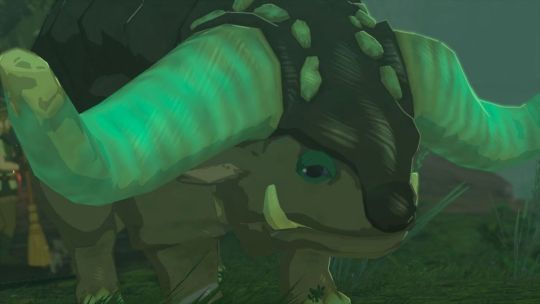
(good gem boys notwhistanding)
The Princess and the Beast
So, a couple of things about the setup. We are investigating potential Princess sightings; but at this point, either because we have already completed a bunch and know the general gib, because we have met a couple of wild Fake Zelda shenanigans, or through the simple fact that we are completing a side quest, we know there's a good chance it won't lead to an actual Zelda information. So when we ask Penn about what is going on and he replies with the ominous "we saw the Princess riding some kind of beast --a frightening one with huge, brutal tusks-- that the princess seemed to control", we get Ideas. Then the sidequest is registered: "The Princess and the Beast".
So. You know me. And if you don't know me, here's what you should know: my brain immediately flared up with the thought there was no way in hell this wasn't some kind of wink towards Ganondorf's renowned boarish beast form, especially given tusks were given so much focus.
My first assumption was: that's a miniboss right? I will get to fight some small boar-like thing that Fake Zelda rides sometimes. Cool! I didn't hold too hard onto my hope that the relationship of Zelda and/or Ganondorf to the natural world, or to each other would be expanded upon, since I had already been burned before, but my interest was piqued.
You have to understand how starved I was for any hint of complexity or mystery or ambiguity at this point. I was extremely eager for the game to throw anything at me that would surprise me, enlighten something pre-established, make the exploration lead to a meaningful discovery or deepening of characters, world or themes (and not just slightly cooler loot, or a bossfight, or a puzzle devoid of emotional context --cohesion and depth is what motivates my play sessions, especially in an open world game that I want to believe is worth losing oneself into). This was about the most intriguing task on my to do list at the moment, and so I plunged in immediately.
After really REALLY misunderstanding what I was supposed to do (I stalked every corner of every forest surrounding the tropical area at night or during blood moons in hope to see something --which was very much the wrong call), I arrived to the other stable, then was guided to the other side of the river where Cima awaits and explains that these creatures are actually a new species discovered by Zelda; that they are gentle and kind and not at all scary ("Dondons aren't beastly, they're adorable!"), and even somehow digest luminous stones into gemstones. They like the company of people and liked Zelda in particular.
I was... I felt two different ways about this conclusion, and I think it's worth to explore both: disappointment and some sort of... "huh!" Hard to describe this emotion otherwise.
I'll get the disappointment out of the way first, because it's the least interesting of the two. While I think the little emotional arc I was taken on was not devoid of interest --I was indeed taken on by the rumor and intrigued by its implications-- I wanted, well. A little bit more. And if the creatures were to be Zelda's pet project, I would have loved for them to be actually terrifying and feisty, and for her to develop an interest for these creatures in particular regardless. It could have been very interesting characterization that veered out of the perfect princess loving the perfect world floundering around her, always bringing her clear, practical benefits from the interaction.
(I have made another post that speaks of my discomfort that Zelda does everything everywhere and everyone loves her for it --I get what they were trying to go for, but it either lacks conflict for me to buy into that dynamic at the scale of several regions, or they went on too hard for my taste, as she is, at once and in the span of a couple of years at most: a schoolteacher, a gardener, an animal researcher, a scholar, a traveler, a military expert, a knower of landscape, a painter, a horse rider, an infrastructure planner, a [...] princess --at some point it begins to sound made up, "Little Father of the people"-esque to rattle the hornet's nest a little bit, especially if it's not shown as either a clearly godly characteristic or, even more necessary imo, a negative trait; another expression of her killing herself at work to compensate for a perceived flaw she's trying to earn forgiveness for, like she did in BotW. But that's another topic, and the clumsiness of her character arc has been well threaded by basically everybody disappointed in the story already.)
But, if I decide to be a little graceful, I'd like to explore my "huh!" emotion, and take it apart a little bit.
I think there's something interesting to have such strong parallels to setting up a story about the relationship between Zelda and Ganondorf ("The Princess and the Beast", like come on guys that's the conflict of over half the series), or at least Zelda and the concept of Evil since Ganondorf pretty much represents it in this game, and then have it go: actually, there was a horrible monster that everyone was afraid of, but Zelda was wise and patient enough to approach it and realize its potential beyond the tusks, what beauty can be brought upon the world if one makes the effort to look for what exists underneath. It says something a bit deeper about the world and about Zelda in particular. It intrigues, at the very least.
Is it a reach? Probably! Is my first interpretation that the quest is actually about "eww you thought Zelda would be interested in *disgusting vile monsters* and not sweet and gentle and human-loving animals that literally shit jewlery when cared for? jokes on you, she never would feel any ounce of sympathy for anything that isn't Good and Deserving" uhhh definitively truer? Probably! But I also don't want to dismiss that the quest made me think about it. If I had completed it earlier, I might have even felt like it was (very clumsy, not gonna lie) setup about the main conflict.
But that's also a good segway into my next section: the arbitrary limitations between the animal and the creature, the monstrous and the human.
And the fact that TotK points directly at it.
A Monstrous Collection
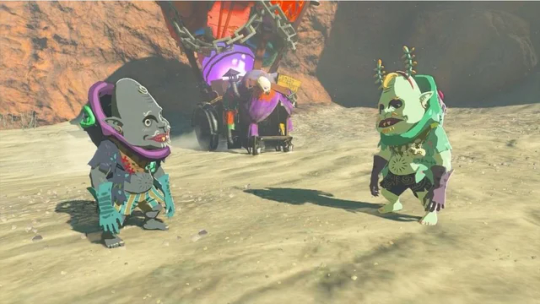
(these two guys are just. doing So Much and being So Valid despite being massive weirdos the game wants us to be slightly repelled by. I, for one, respect the Monster kinning grind and their general Twilight Princess energy.)
So. These two guys. There is so much to say about these two guys. I don't think I have seen the Trans Perspective on Kolton on tumblr, and I would love to get it because. I feel like it's a worthwhile discussion (just, how gender and identity is handled in TotK overall, I feel like it's a very complicated conversation and I have not seen super deep dives and I'd be very interested in hearing more).
Beyond the throughline of voluntary consumption of magical objects to turn into less human creatures being a weirdly prevalent plot point in TotK (Zelda, Kolton and Ganondorf casually transing their entire species for funsies --Ganondorf being particularly relentless with Fake Zelda, mummy/phantom shenanigans, Demon King and then literal dragon), I want to focus on Kilton a little bit.
Kilton is genuinely the only NPC in the game willing to acknowledge the inherent personhood that monsters have (the game does showcase them picking up fruits, mourning their boss if you kill them, being cutesy and happy to identify you as one of their own if you wear the appropriate mask --and that's not even getting into creatures like the Lynels, who seem to really edge on the limit of being a conscious creature with a system of honor and property and many other things). He does encourage us to think of monsters as more than a species whose only worth lie in how fun it is to eradicate them; even more, gameplay-wise, he does give us a reason to interact with them in other ways than just our sword with his museum. He does encourage us to see that beauty for ourselves and then select what we think is coolest/most intimidating/cutest/eight billion ganondorfs in every pose imaginable
The fact that Ganondorf is considered a monster was a great win for this feature in particular, and is very funny, but it's also... A lot, if we dig at it a little more than warranted. Beyond all of the Implications and all of the things of representation and political conflict and values already discussed ad nauseum: when did he stop being considered a human? What does that mean about the flimsiness of what is a monster and what is a creature and what is an animal and what is a person and what is even a hylian, as sheikahs got absorbed into the definition in this game? Especially with the stones taken into account, how profound changes in nature are a huge part of the plot (even when reversed and ultimately pretty meaningless): how easy it is, to make that slip? Who decides when that slip has been made? What is acceptable to hurt without remorse? What is beautiful and worth preserving? What is both at once? What is neither?
And again, in a classic Zelda conundrum (appreciative(?)): who the fuck gets to decide that, when, and why?
The Bargainers and the Horned God
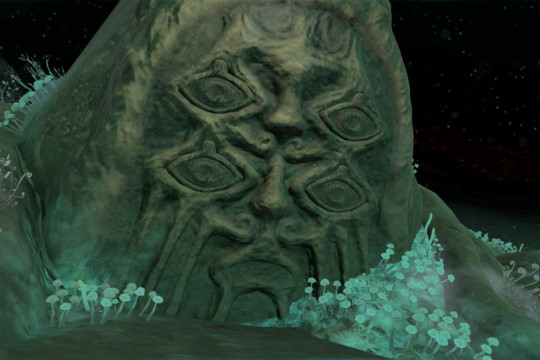
(major shoutout to these big guys for being the sole and only providers of actual depth to the Depths, and for looking cool as heck)
So. Let's move the conversation to the Depths.
Conceptually: what an interesting idea!! And so well executed (initially)!! A mirror world to the surface, dark and hushed and full of unknown creatures; haunted by gloom and sickness and the unknown. Not a first in the series, far from it: from ALTTP to ALBW, and even taking the Twilight world of TP into account, this idea of a Dark World acting as a deforming mirror to Hyrule and revealing many interesting aspects as we get to explore both is always a very interesting take on corruption and envy and fear/weakness and/or some sense of darkness looming under the perfect exterior. I'd argue even the Lens of Truth of both OoT and MM's serve a similar function, both gameplay-wise, but also in terms of theme: not everything is as it seems. In the world of Light, darkness must hide itself; but darkness also possess its own beauty, its own hardships, and will stare back at you without blinking if you go seek for it. It's, in my opinion, one of the series' most compelling conversation about the cyclical nature of fate, the coldness of godhood, and how small one feels in the face of a universe that is more complicated than it initially appears --which is why Courage must be invoked to push forward regardless.
The Depth's otherworldly ambiance is truy wonderful, whether in the plays of light and shadows, the creatures native to the environment we meet there (wish we met more!), the soundtrack, the strange aquatic/primordial plants, the fact that the dragons visit this place and connect them to the outside --invoking ideas of balance and interconnectivity, that the tree branches look like veins. The coliseums, the mines, the zonai facilities and the prisons do seem to poke at many things about what the relationship to the past was to this place; was it ever truly a place? Did it look like this back then? Why was it buried? Why did it come back? But in spite of it all, I think the Depths struggle overall to question or reveal anything about the surface that we couldn't already assume going in (that the only thing congealing there is Ganondorf's gloom, his lonely domain of Wrongness, only shared by Kohga and the yiga --the only naysayers of Goodness and Light, contemptful and blinded by self-importance and rage). The zonite is mined by gloomy monsters --why, what for?-- so any notion of greed and over-expansion that could have been associated to the zonai is now reabsorbed into Ganondorf's general evilness, since it needs to be reminded he is everything and anything bad with the world: darkness and conquest and greed and capitalism and pollution and bad weather and sickness and darkness and violence and war and death and betrayal and fakeness and lies and patriarchy and exploitation. No matter that he never does a single thing with zonite in the game; rather set up elements of conflict that never go anywhere than, for a second, let the foundations of absolute goodness and absolute evil risk becoming shaky --and you coming to this unwelcoming dark place that hates you, killing the miners and taking their resources for yourself is, on the other holy, royal fur-covered hand, utterly legitimate. The resources were once Rauru's after all, were they not?
And this is what I would say, except... except for the dead. The fallen warriors, the poes, and, most important of all: the Bargainer statues.
The Bargainers are, in-universe, godly creatures guiding the fallen to a place of final respite, regardless of moral alignment. The poes are all, fundamentally, cleansed of judgement: they are lost souls whose past reality does not matter anymore, and all deserve that peace regardless. In spite of the heavy paradise/hell parallels drawn in that game, with Rauru/Zelda/Sonia as the guardians of Light where Ganondorf gets to become a Devil-like figure, it is confirmed here that no such thing exists when you actually die in this universe.
It almost feels as if the fabric of Hyrule itself, in a brief moment that refuses to elaborate on its own point, goes: "yeah, whatever is happening here between Light and Darkness, it doesn't actually matter. This conflict is futile and doesn't understand the real nature of being alive, dead, a god, a person, a monster, an animal. The truth lies elsewhere --but you will never be told what it is."
It's: wild.
One of the game's most striking traits of narrative brilliance in my opinion --to the point where I'm wondering whether it's there on purpose or was effectively an oversight since every other aspect of reality breaks its own back trying to reassure us that everything is at its correct place, receiving the appropriate treatment by the universe in a way that is never to be questioned.
Another case of that ambiguity being allowed to exist without being immediately crushed and repressed is the case of the Horned God (interesting parallel to Ganon's actual horns that he develops in this game in case the hellish parallels weren't clear enough already): a demon Hylia sealed into stone and pushed far from humans in a clear case of questionable behavior since, while the Horned God isn't exactly nice, does propose a different philosophy you are not punished for exploring; and yet, a proposal that has seen itself persecuted in a very real sense by the goddess of absolute goodness, patron of hylians, Zelda, and many more. Pushed away from view.
Interesting.
And Yet, Light Must Prevail
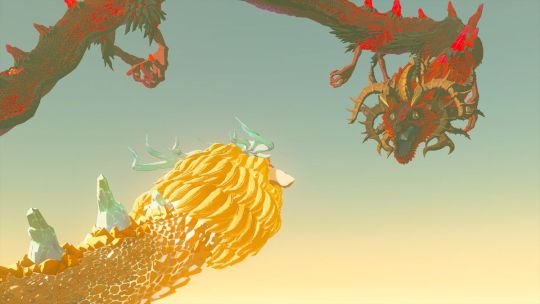
Okay, so, after all of this, we're left to ask... What the fuck is up with morality in Tears of the Kingdom?!
What do we trust? These half-breaths in the occasional sidequests that Light and Darkness is just the wrong frame of reference, that nature cannot be this simple, is ever-shifting and can be recalled or reaffirmed by arbitrary forces, and might even not matter at all in the universe's fabric, despite having so much of its lore soaking in the dychotomy? Or... everything else about the game, this insistence that Good must not only be assumed as whatever tradition the kingdom has passed down for thousands upon thousands of years, but remain utterly unquestioned the entire time? That Bad is without cause, graceless and unworthy of investment?
Are the Bargainer's statues the only thing worth listening to, that morality is a fable the living tells themselves --or should we be moved when Darkness destroys Light, when Light suffers to preserve itself and the world --but not when the Other is rightfully slain?
Was Kilton correct to see beauty in the monstrous? Was Kolton onto something when he let go of his previous form because there is no clear distinction between what should receive an arrow to the face and what shouldn't? Or should we rather focus on Zelda losing her human form as a beautiful and tragic sacrifice --but something that never actually altered her nature as a hylian, the descendant of a lineage of Good Kings meant to rule forever?
Is the Dondon good because it always was, or was it worth Zelda's love in spite of the fear it initially provoked?
Either way, at the end of the game, evil is slain. Ganondorf is, not killed, but --like his angry BotW boar counterpart-- destroyed, as monsters tend to be. He explodes over the lands of Hyrule, freed from Darkness; freed from everything wrong, since the foreign menace that embodied it all was wiped out in one fateful sweep of a holy blade cradled in sacrificial love. Nothing wrong remains. The Sages reaffirm their vows to protect the kingdom forward, and a very human --hylian-- Zelda smiles: Hyrule now forever and ever basked in eternal Light.
#totk#thoughts#tloz#totk critical#when will my brain return from the imprisoning war...#ganondorf#zelda#rauru#bargainer statue#kilton#kolton#dondon#this one gets a bit conceptual but#morality in totk is SUCH a headscratcher#I think this ambiguity is genuinely the only thing that keeps my brain interested in the subject#I am of the opinion that there was a big rewrite at some point#that severely simplified the conflict#and that morality was initially more a topic in TotK because.... the traces do seem to remain#it could also 100% be a case of developers not caring about themes at all whatsoever#and not realizing what they are saying or putting into question#but#worth pondering upon
370 notes
·
View notes
Text
Some Future Marvel Rivals Season thoughts (repost)
(Reposting bc I realized I could add pictures lol)
Been playing way too much Marvel Rivals lately instead of focusing on my new semester of law school and I may or may not have come up with a bunch ideas for future seasons based on how Season 1 has introduced the Fantastic Four
Assuming that the basic structure of a Marvel Rivals season is (1) an antagonist character consistent with the theme of arriving playable characters who is not really broadly appealing enough to be playable themselves; (2) 4 characters to be rolled out in pairs throughout the competitive season with at least one of each main role; and (3) 2 new maps, one for competitive play and one for an arcade game mode; the following are some of what I'd love to see
X-MEN



Antagonist: Henry Gyrich and/or Bolivar Trask and the Sentinels Maps: Xavier School for Gifted Youngsters, Master Mold Characters: Cyclops (Duelist), Emma Frost (Vanguard), Jean Grey (Strategist), Colossus (Vanguard) I'm honestly still stunned that Cyclops wasn't included at launch but here we are I suppose. I'm not gonna argue about Emma Frost being a vanguard, she's literally a diamond lady, let her shift forms to become invulnerable. Jean should summon the Phoenix for her ultimate to do huge healing and damage, and honestly, maybe have a self-ressurrection ability like Adam Warlock? Lastly, I refuse to play Hulk right now because the real fastball special is done with our big Russian farm boy, not some green science nerd.
EXCALIBUR


Antagonist: Opal Luna Saturnyne Maps: Otherworld, London Characters: Kitty Pryde and Lockheed (Duo Strategist), Nightcrawler (Strategist), Brian or Betsy Braddock (both Vanguard), and Rachel Summers (Duelist) I think that we need more mutants, more strategists, and anohter funny little non-humanoid guy like Lockheed who could be incorporated into Kitty's ability kit as an ultimate or something. There's also just so many mutants to add that i think grouping them by teams like this is a better way than to just add the most popular mutants all together, and leave little thematic cohesion between those left behind.
KRAKOA



Antagonist(s): The Sinister Clones (Dr. Stasis, Orbis Stellaris, Mother Righteous) Maps: Krakoa, Arakko Characters: Charles Xavier (Cerebro helmet version) (Strategist), Mr. Sinister (Strategist), Apocalypse (Vanguard) and Mystique (Duelist) Also how did this game not launch with a Krakoa map? Anyway, we gotta get Chuck in here because I know we'll get some fun voice lines between him and Magneto. I've seen people talk about him being in the chair, but I think since Magneto is so clearly a Krakoan version, Charles should be the same, therefore no chair, not even no fancy flying Shi'ar contraptions. I think that Nimrod would be a super fun character to play as, but I could see them passing over him. There's less clear opportunities for team ups with Nimrod, and Apocalypse is just the more popular one. With Chuck and Apocalypse, the other two being members of the Quiet Council of Krakoa just makes sense, so lets get some bad guys in here.
THE DEADPOOL+CABLE/X-FORCE SEASON



(OK, i swear this is the last one about mutants) Antagonists: Mojo Maps: Ashkahni Future, Marvel Studios Offices/Mojoworld Characters: Deadpool (Duelist), Cable (Vanguard), Domino (Strategist), Shatterstar (Vanguard) They can't just not do Deadpool eventually. It wouldn't make any sense to just leave out such a popular charcter, but I would love to tie him into some X-Force theming. Plus, shifting the season's focus to more Cable-related stuff would help avoid how Deadpool's constant 4th-wall breaking can get a bit repetitive. I'm imagining a map for Mojoworld that is kind of like if Mojo was Kevin Feige or something?
GUARDIANS OF THE GALAXY/ANNIHILATION WAVE




Antagonist: Annihilus Maps: Xandar, Knowhere Characters: Drax (Vanguard), Gamora (Duelist), Moondragon (Vanguard or Duelist), and Cosmo the Space Dog (Strategist) We know they have to round out the core guardians roster eventually, but I think that the Annihilation Wave would be a cool backdrop for it as a storyline. I could also see perhaps a different map instead of Xandar like the Negative Zone because it would have significance for our cosmic characters and the Fantastic Four.
ALL-NEW AVENGERS





Antagonist: The Leader Maps: Palos Verdes (West Coast Avengers HQ), Avengers Mountain Characters: Giant-Man and the Wasp (Duo Vanguard), She-Hulk (Vanguard), Vision (Strategist), and Captain Marvel (Duelist) I know I'm always gonna choose my X-Men over the Avengers but we gotta show them some love. We're missing huge characters in the Avengers lineup here, and this would fill those gaps pretty well. A duo Vanguard like Cloak and Dagger in Hank Pym and Janet Van Dyne would be so cool. Maybe an ultimate that shinks or grows allies or enemies? I'm also missing my beautiful green attorney Jen Walters, so let's fix that. And both Vision and Carol Danvers are big enough characters to demand inclusion too.
CHAMPIONS


Antagonist: Gwenpool Maps: Jersey City, Carefree, Arizona Characters: Ms. Marvel (Vanguard), Spider-Man (Miles Morales) (Duelist), Sam Alexander (Duelist), Viv Vision (Strategist) Kamala is so precious and perfect and wonderful I must play as her as soon as possible. Miles should have more of a focus on his electric venom powers but still play pretty similar to Peter. I neglected to put Richard Ryder on the GOTG season because I just think Sam is a better pick for the mantle in this game. Lastly, the fourth member would have a problem: Viv would be very hard to differentiate from Vision, and our alternatives have the same problem. Amadeus Cho is not meaningfully different in powers from Bruce Banner, and Kid Cyclops is literally just Cyclops but younger. Idk how to fix it but i want it. I also think that Sam Alexander's town of Carefree AZ would be a fun, super suburban nuketown-style map.
MIDNIGHT SUNS




Antagonist: Nightmare Maps: Nightmare Realm, Everglades Characters: Man-Thing (Vanguard), Blade (Duelist), Ghost Rider (Duelist), Doctor Voodoo (Strategist) I'm not a huge Ghost Rider head so I dont have a huge preference for Robbie Reyes vs. Johnny Blaze but I think I prefer Robbie's design. Maybe some kind of gestalt between the two or just a skin would make me happy. Definitely prefer him to ride a motorcycle than drive a car though. It was wild IMO to do Fantastic Four vs. Dracula for Season 1 and not save Dracula for these guys. Other than that, yeah get more of the supernatural side of marvel in this game.
SPIDER-VERSE




Antagonist: Morlun and the Inheritors Maps: NYC Loomworld (mash-up of NYC Noir, Spider-Ham's NYC, and Nueva York 2099), Oscorp Labs Characters: Spider-Gwen (Duelist), Green Goblin (Duelist), Doc Ock (Vanguard), Black Cat (Strategist) Gwen and Cat are gonna bring in a certain kind of fan but lets be honest thats the business model here. I think that this season would launch with SO many skins for our spider-characters too. Would be cool to get some more bad guys in here. I'm most excited about the Loomworld map though. Just the clashing art styles making a city environment would be super unique.
I also think to partly solve the problem of characters being too similar or having alternative versions, perhaps some characters can just have complete model swaps and keep the same controls and kit? Like I love Laura Kinney Wolverine/X-23, but yeah she would just play like Logan. What if you could take a page from Smash Brother's book and do Echo fighters perhaps? Let me play as X-23 with unique voice lines and team ups, but just essentially play Logan's kit? Not sure how this would work balancing-wise having two Wolverines on the field.
Other characters I'd love to see which I couldn't really fit into this format include Hisako Ichiki aka Armor, Fantomex, Elixir from Academy X, Exodus, Kid Omega, Forge, Polaris, Iceman and probably a bunch more I'm not thinking of just yet.
Would love to hear anyone else's ideas formatted like this in the replies! Or just thoughts in general! Hope everyone is enjoying the game as much as I am! Also definitely looking for mutuals who wanna do competitive together and yap about comic books lol.
#marvel#ms. marvel#marvel rivals#marvel champions#xmen#x men comics#the x men#x men#charles xavier#magneto#spider man#spiderman#peter parker#miles morales#ms marvel#captain marvel#spider gwen#gwen stacy#x comics#ghost rider#marvel comics#the avengers#avengers#wolverine#x 23#logan howlett#robbie reyes#johnny blaze#doctor voodoo#man thing
1 note
·
View note
Text
I've been eyeballing this set for 20 years:
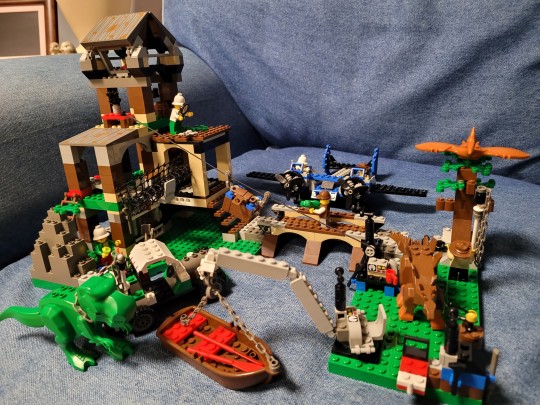
Dino Research Compound (5987].
The Dino Research Compound is the pinnacle set for the third sub-theme of Adventurers, a pastiche of Indiana Jones. Adventurers is singled out fairly common now for being an example of how, had LEGO always had the opportunity to do licensed sets, they would have, and it gets worse with this sub-theme, Dino Island, getting Jurassic Park (1993) in on the mix.
Dino Island comes immediately after the Egypt and Jungle sub-themes of 1998 and 1999, coming to us in 2000, and sets itself apart by not taking place in a real world location nor concerning itself with the two factions, led by Johnny Thunder and Sam Sinister respectively, fighting over treasure hunting. I'm not sure how most Adventurers fans felt about this shift, but it's fine by me given how much it dials back on the colonialist concepts present at the forefront of the theme.
Dino Island sees the two parties trying to capture dinosaurs, but most of the sets in this sub-theme are stretched a bit thin to try and meet the new concept, as the majority of sets are vehicles with either no dinosaurs or a single Pteranodon or baby T-Rex present. The big multi-piece dinosaurs are saved for the most expensive sets, which is kind of a shame; you'd have to fork over a lot of money to get a T-Rex, but it's a practice that wouldn't stick around forever (see: LEGO Vikings presenting a smaller set with Fafnir so you could get a compromise if you couldn't afford the giant fort with Nidhogg).
This set specifically: we get the main compound, a bridge, a side build with a tree and some machinery, a plane, a jallopy, and a boat! Let's take these one at a time.
The research compound is three stories tall and uses what I'd call "dollhouse" LEGO construction, wherein instead of building up the structure in its entirety, you instead build each story individually and they connect with little clutch power. The bridge doesn't use any clutch power, as it's connected by loosely fitting anti-clip poles, on both sides. The side platform doesn't have a main feature to speak of.
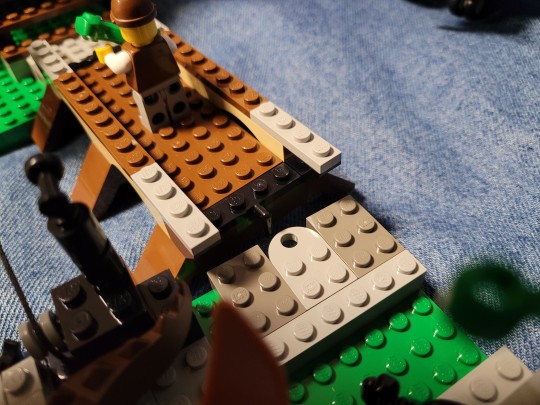
There isn't a "cohesive" quality to the entire build, it's mostly just littered with play features:
There's a dinosaur pen on the first story of the compound that can open up to house the baby T-Rex.
There's a net tosser on the second story.
There's a fall-away floor trap on the second story.
The top of the compound can unfold to reveal a satellite dish (which, may be a historical anachronism given this takes place in the 1920's?)
There's a zip line connecting both main areas that can have some supplies run down.
The tree can be toppled over.
The boat can connect to the crane or a docking point.
The plane can drop a net.
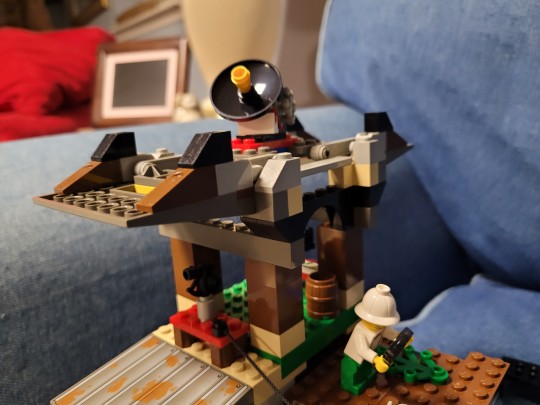
There's a litany of tools lying around, on top of the three vehicles and four dinosaurs, and it didn't hit me until after I had finished assembling it; this is a play set designed for *multiple* children to ideally share. The sheer volume of stuff going on can't mean anything else, and given the original MSRP of $80 (which, regardless of all other economic factors, is a high call for a LEGO set) further leads me to this conclusion.
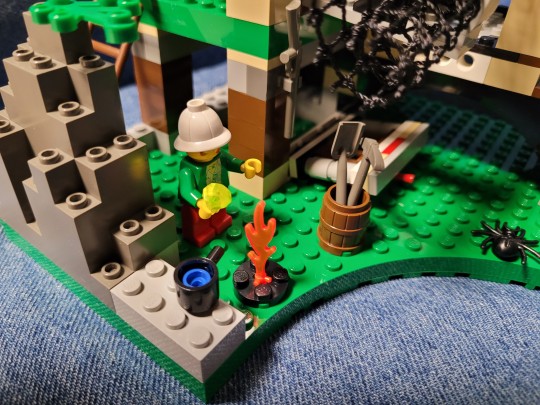
Talking about more specific features, this set coming out in 2000 isn't a huge shock to the senses after I've purchased and built many 2020's LEGO sets, but it is a strong sign of how much things are different. For one, despite its size, the set only has a little over 600 pieces. An equivalent sized set now would feature two to three times as much. Dino Island was released in the middle of The Lego Group's identity crisis as a company that spawned a huge volume of experimental ideas that mostly did nothing except make builds worse and spawn the most reviled LEGO themes (Znap, Scala, Galidor, Jack Stone, etc.). I was braced for this to be a "juniorized" set but was actually surprised at how satisfying the build was overall. It doesn't feature a raised base plate like the previous two largest Adventurers set, which I might add did suffer from rather homely looking builds.
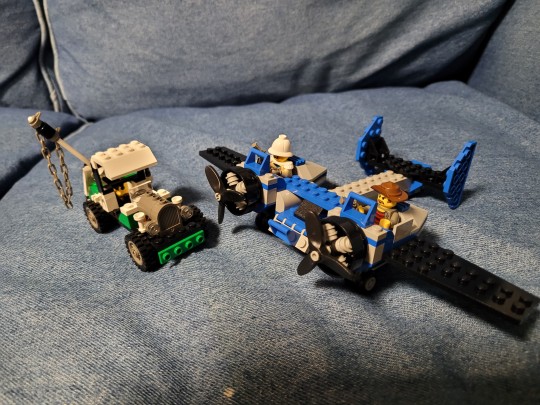
The low piece count however does mean two things. For one, there is a lot of hollow space in this build. Most rooms in the compound don't have anything going on. The build also doesn't use much any advanced building techniques, it's very much of that classic LEGO design where you aren't doing much more novel than stacking bricks on top of each other. LEGO sets now are kind of insane; you connect bricks to the sides, tops, and bottoms of other bricks, they're there for really intense structural support that gives them the feeling of being impossible to meaningfully break if you dropped them. The Dino Research Compound, on the other hand, is coming apart given any amount of gravitational force. The two vehicles are decent enough, but special mention should go to the plane both for its color scheme and how it isn't built on an obnoxiously large plate, though I'm not sure if I've seen any actual planes have two completely separate pilot compartments.
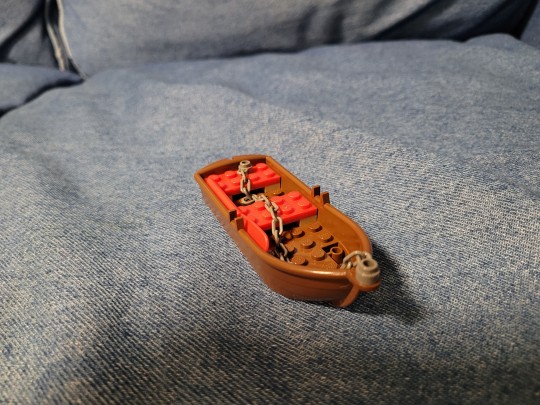
Also of note is the inclusion of the "old" brown color which has since then become replaced by a shade of brown slightly lighter and more reddish. The roofing pieces with the rust prints, the green base plate with the rounded edge, and the Stegosaurus with dark orange legs (another discontinued color) are all set exclusives. I kept my eyes out for pieces from the experimental era, large and highly situational parts. Probably my favorite thing about LEGO now is how pieces can be repurposed for any number of designs, and seeing late 1990's sets like those from Rock Raiders make me cringe because of how highly specialized parts they include. The boat caught my eye, considering it's all one piece and not brickbuilt, but much to my surprise it's a piece still in use now. There's an oddball mix of what's brickbuilt and what's not however, such as the sextant being all one piece but the microscope is built from scratch.
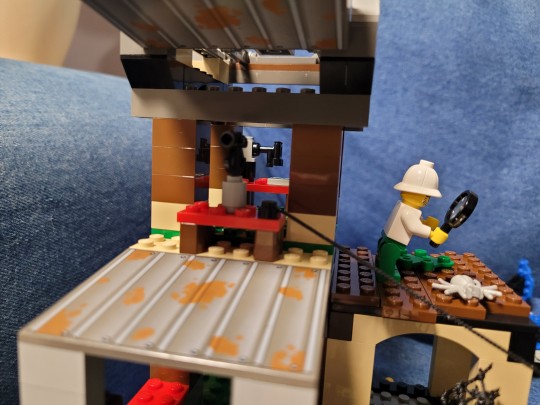
You get the entire cast from Dino Island minus Sam Sinister's sister (name is eluding me right now). For dinosaurs, you get everything from this line sans the Triceratops. The baby T-Rex has a single connection on the bottom, and can be held by a minifigure comfortably. The Pteranodon is an odd one. It's feet are clamps but there's not much use for them, but it can be put onto any 2x2 stud surface, and it has two studs on top. The Tyrannosaurus and Stegosaurus both have four studs on top (perfectly for a minifigure to ride on) along with a 4x6 foot print. Though they're the titular characters, the dinosaurs are rather tiny compared to their actual size and should be considered accessories rather than the stars. The Stegosaurus reuses the tail from a LEGO crocodile, and the Tyrannosaurus reuses the arms from a LEGO dragon, firmly placing them into the LEGO animal family, which makes it a shame that none of these molds lived past 2001.
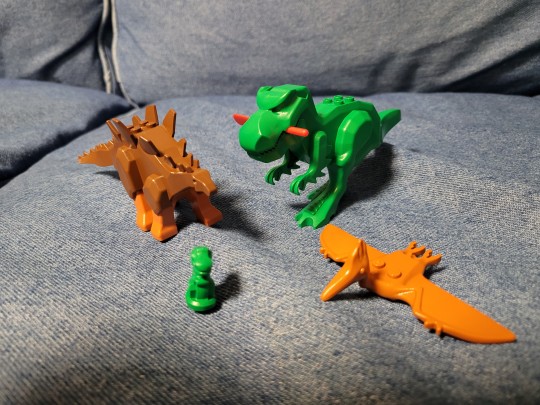
If there's anything else of note, for one, the front of the box opens up to give a peak at the pieces inside. The right side of the box includes a plastic insert to show off all the dinosaurs, and there's a cardboard divider as well. This and the set's construction make it easy to just disassemble the big chunks and comfortably put them back in for storage. The instructions also include some brief steps for alternate builds, at a very rare period when LEGO actually did that, though the alternative builds aren't anything special. The instructions also end on a brief summary of the species included, though since LEGO instructions are supposed to be language independent, there's not much they can do. Interesting to see lumbering tail-dragging dinosaurs in 2000 however. What seals the overall set for me is this set includes the same 2001 catalog I originally saw this in, it all comes around full circle...
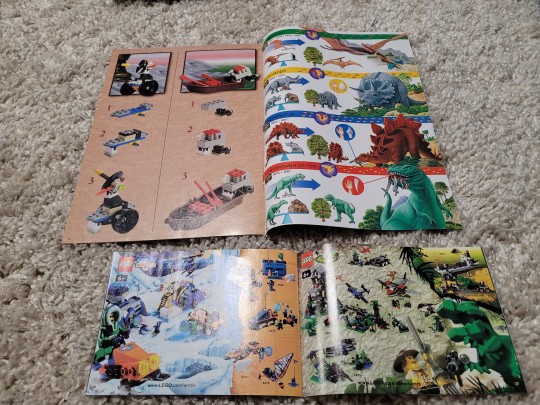
18 notes
·
View notes
Text
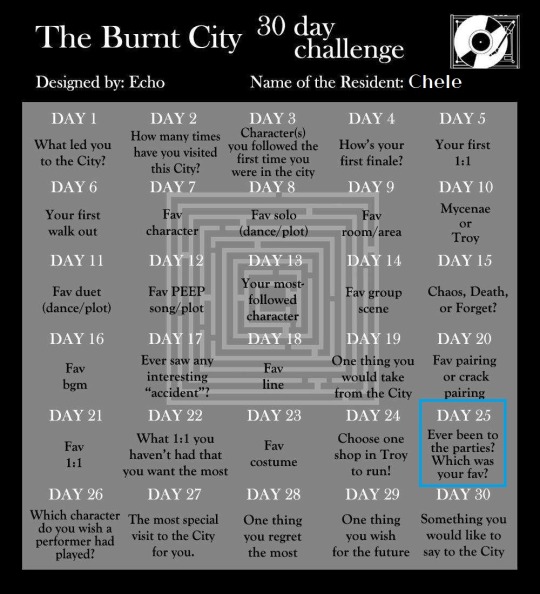
Day 25: Ever been to the parties? Which was your fav?
I attended all of the official parties and Remix events. I didn't attend any of the Peep Lates, due to timing.
I can think of reasons why each of these events could be my favourite, and it's incredibly difficult to pick between them.
New Years' Eve Remix was not only the first Burnt City party I attended. It was the first Punchdrunk party. It also came at a time when I had spent the majority of the previous 2 years big dates at home on my own due to Covid. Holiday seasons had been spent at home or without big events, so going to a huge party in what was quickly becoming one of my favourite places with a number of my favourite people was not only exciting, it was a comfort I had been missing for a long time.
Similarly, Last Rites in September 2023 was a hugely emotional affair. This would be the last party/big event we had in this space. We had a week left of shows, and then I would undoubtedly not see many of the people I had come to adore so deeply. Or, at least, I would not see them as frequently, and I wouldn't turn up to find we were unexpectedly at the same shows. Everything would need to be planned in advance for the most part. The joyful chaos was ending.
The performances at Last Rites were incredible, and the inclusion of karaoke in Klub was a joyful one. By this point, Punchdrunk had a great grasp on what their audience wanted from a party, and were offering a wide variety of entertainments. I was also more familiar with the format, and so I managed to catch everything I wanted to see.
The Lipsync battles after Remix in August was so unbelievably fun and entertaining. I wish we could have had more evenings like this. Sunday nights where everyone can let loose a bit, enjoy some madness. Even without Remixing the show, having events in Peep once a month or so, and on Sundays where they wouldn't have had to go into their late-night quota, would have been spectacular, and I certainly would have paid extra for a Sunday ticket more frequently if they included post-show entertainment like this. It was such a simple idea, and yet it worked so unbelievably well.
But, for me, I don't think any of them can quite compare to Ascension in April. This comes from a combination, I think. It was the second party, meaning I still had the initial excitement to explore the set and take photos (trying to ensure I captured photos of things I'd only managed to get blurred pictures of at the last party.) But, being the second party, Punchdrunk had learned a lot from the first, and had incorporated a lot more.
The performances at Ascension were not only stunning from a visual, audio, and talent standpoint, but they were so themed to this idea of the religious festival for Persephone's Ascension for Spring, that they took on a mythical, mystical cult element.
As the audience, we stopped being something as mundane as a variety of individuals seeing a fiction theatre show. We descended into a fever dream. We ascended to a place where we became a cohesive and bonded cult of worshippers to this religion within the Burnt City. We celebrated our religious holiday with food and drink, with singing and dancing. We wore the ceremonial colours and made every effort to present ourselves looking our best to worship at the altar of our Underworld Goddess for our most sacred holiday.
Persephone ascended for us, and we were going to make damned sure she knew how much we appreciated it.
#the burnt city#punchdrunk#immersive theatre#greek mythology#greek myth retelling#tbc#tbc 30 day challenge#Ascension#Last Rites#Remix#New Years#Punchdrunk parties
4 notes
·
View notes
Note
I just finished Who Waits Forever Anyway? and I just wanted to drop in and say that I ADORED EVERY MINUTE I SPENT READING IT. I'm not in the NATM fandom (I haven't even thought about it for like 10 years lol) but wow the mythology the characters the THEMES. I love how you fleshed out The Magic and made everything cohesive, especially all the small hints (I think I saw something about Katherine's drawings turning blue being a reference to Osiris which made me lose my mind). There were just so many things that made me go "Yes! Nobody ever gets that right!!" It was clearly so well-crafted, both in the writing and the research. I'm not super articulate when I try to talk about fics I like but I'm just so overwhelmed with love for this one. (Also, I was wondering, is the "vitiligo meaning Ra has looked upon you" connected to a real association from back then?)
AHHHH THANK YOU SO MUCH!! I'm so glad you liked it!! This fic has been a love letter to history and mythology in every single way, and it means so much to me that another mythology nerd enjoyed it!
I was this 🤏 close to being an Egyptologist myself (I was an anthropology major for a bit, but college wasn't the right place for me) and I still have so much love for that branch of history, and just history as a whole. I even gathered sources and intended to write a paper suggesting the god Tutu was borrowed from the Babylonian god of the same name after the Neo-Babylonians entered Egypt... but the Egyptologist I was trying to contact for more information never emailed me back, so that was a bust. Either way, I'm a HUGE nerd for this stuff and I've really enjoyed implementing it into the fic!!
(fun fact: the professor Katherine talks to about the tactile worker's scroll is modeled after my Development of Western Civilizations professor in college, since he was a really cool guy and I wanted to give him a shoutout. His focus was Roman history rather than Egyptian, but the mannerisms and speech patterns are the same)
As for the vitiligo thing... yes and no. The premise of it is just something I came up with, there's nothing (currently found at least) that suggests they saw vitiligo as linked to Ra or the other gods in any way, but I did try to keep it rooted in the evidence I did find. Vitiligo was indeed present and known in Ancient Egypt, as treatments for it were mentioned in the Ebers Papyrus of medicine (in case you were curious, the treatments involved rubbing the skin with certain plant oils, then having the person sit in the sun. It reads to me like a method to tan the afflicted skin to make the vitiligo marks less visible). As for the connection to the sun god, I borrowed that from a Vedic myth about Bhagavatam (the sun god) being looked on by his illegitimate son and developing vitiligo as a result. It's sort of an... educated guess, let's say, since the condition was present and we see similar myths in other parts of the world.
I feel like there's a fair amount of these connections throughout the fic - it's a combination of just pure facts from my research into the various cultures and historical timeline, and a bit of educated speculation on my part (mostly just for fun, sometimes to tie story elements together in a satisfying way). The NATM movies are part of what initially sparked my love of museums and history, and as an adult I love how much work went into the sets and costuming, so I wanted this fic to reflect the same level of education mixed with entertainment.
Oh, and don't worry - there's more I have planned for this fic, I've just been damn busy these past few months and am still working on writing the next chapter. I'll get there soon, I promise!! This isn't the end just yet!
Thank you again for reading and giving me your thoughts!! You have no idea how much this made my day!! I'm smiling so much at this!!! <3
1 note
·
View note
Text
Bland Identity
November 13, 2023
I received feedback on my creative brief and have begun ideating for my logo.
Currently I am thinking of using my name as the business and emphasizing the 'Mill' part. Initial thoughts are somehow incorporating a water wheel as a visual aspect in the logo. I tried this last year in graphic design but couldn't quite get it to work. Maybe it'll go better this time.
November 15, 2023
Went through everyone's brand analysis and learned a few things about a few companies. Interesting stuff.
Continued work on the logo. I can not work it into something I am happy with, so I'm moving on to new ideas. I have researched production and musical terms, and have landed on Crescendo Studios. A crescendo is the peak in volume after a build up, and is meant to represent my brand being the peak in Medicine Hat's entertainment industry after I build it from the ground up.
Initial thoughts with this logo is to incorporate the crescendo symbol into video production visuals. (clapper boards, scissors [editing], and the red dot used to indicate recording). This has got to go better.


November 22, 2023
Missed class on Monday to recover from a persistent cold, but today went better! After spending the class getting my ideas down on the screen, I think I finally found something I am happy with. It's simple, but I think it makes sense and gets the point across of my overall brand.
I used the crescendo symbol to cut out a piece of the red dot to create the form of a 'C' and used that in place of the 'C' in crescendo.

November 27, 2023
Nevermind! thought about the logo constantly this weekend and decided I actually hate it. Need to keep processing my ideas until I can find something I like again. I've got a few more of them, so I'll see how today goes, hopefully I'll stumble into something better.
At the end of the day, I didn't really make anything worth talking about. I need to move on to the style guide just to get my head off logos for a while. I figure since the brand is about bringing music into the visual world, I want to put my style guide onto a record or CD cover. I like the idea, but it's a bit like a couple projects I've done before. I'll keep thinking of ideas, for now I just need to start on the information part.
November 29, 2023
After the defeat of last class, I came back to it and finally made something I like. I changed my idea almost completely and ditched Crescendo. I moved on to Rechord. I think it sends a more straight forward message and the logo developed much easier than the last. I stuck with the 'red dot for recording' theme, but I've switched it up and after many different iterations, I found something I'm happy with.
Workings


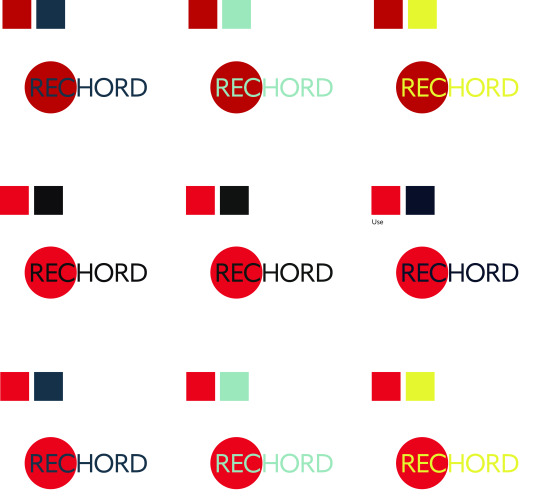
Final

There are some changes that could be made for sure, but I'm at a good place with this logo, and I really need to get a move on with this style guide.
For the guide I'm thinking of sticking with the CD idea. Maybe model it after a cover of a band I enjoy. So far Closer by Joy Division is the only one coming to mind, but I'd like to make a couple different ones just to experiment. As for the CDs inside the case, it might be kind of fun to use them as a business card of sorts.
December 4, 2023
After meeting with Ian last class and talking to Jenna about it, I have decided to change my logo again. Not a huge change, but a necessary one (I think).

It looks much more cohesive and refined, in my opinion. As for the colors, I think the red is too harsh. I need it to reinforce the recording button thing, otherwise it's just a circle, but I need to make it less unpleasant to look at.
The style guide is also coming along. I don't think my appropriation idea is as great as I thought it would be, but I'll keep working at it to see if I can make something of it. Maybe I just need a new cover to work from.


December 6, 2023
Today's the day! I feel really good about what I did in class today. After another failed attempt at making an album cover inspired style guide, I completely abandoned the idea and switched directions again.
Failed Attempt

The new direction is a simpler one. I'm a pretty simple person, not a big decorations guy, so why make my brand more elaborate than it has to be? I took inspiration from a couple other style guides, but made my own design that is simple and minimalistic.
Inspiration




Final Design


The red is still pretty bright, but I muted it a little bit, and I think it makes a big difference. I didn't want the white I use to be too bright so I dimmed it with a bit of yellow to make it a little easier on the eyes. I needed an accent color to go with the brand, so I chose blue. I chose it because I like blue, but in the business world blue is associated with trustworthiness and dependability. Just like the cream color, I didn't want the black to be too contrasting so I brought down the K value and added color to help lighten it up.
Mock-ups
T-Shirt

Hoodie
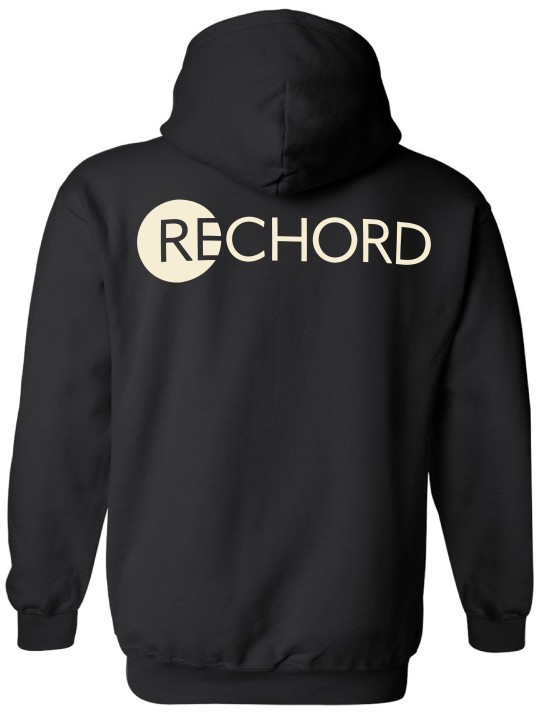
Hat

Headphones

Canoe

Final Design Rationale
The style guide I designed needed to reflect my brand, RECHORD, and the services I provide to my clients. To do this I chose a name that includes references to music and video elements, as well as designed a logo that incorporates a red circle that is meant to represent an active recording. For the colors; I chose red to symbolize the act of recording, and to associate myself with energy and emotion. The green-blue is to associate myself with the feeling of trust and responsibility, as well as a contrast to the red using a complementary color. I didn’t want to use pure white in my design because it could be too harsh to look at on screens, so I diluted it with extra color to make it easier on the eyes. For the same reasons, I chose to dilute the black as well. I chose the typeface Apparat, because it was clean, legible, and geometric so the circular letterforms would be reminiscent of a camera lens. I chose to make the guide a CD cover because it was a fun way to present myself while also staying true to the brand's services.
0 notes
Text
I’ve wanted to share this from my Reddit account to my Tumblr just to see if anyone else out there has any advice for this creative shift in me:
“Hey everyone! So, the title of this is kind of a lie — I’ve been a big-time reader and a small-time writer for a good portion of my life. I always read fantasy and my dad is big into figure drawing, fantasy worlds and writing poetry and a lot of the time I followed in his footsteps. Occasionally I’d write up characters or fantastical worlds or little scenes here and there, but I found that that spark would often go out and I’d often indulge in other creative interests like reading or music. (EDIT: that being said, it always interested me to write up characters and worlds and themes for them to explore, even if I drifted in and out of it.) It’s kind of that way for a lot of my creative “interests” — I tried things like embroidery but fell off the wagon and did the same thing with learning guitar. Basically, I find that I fall into these creative outlets that, for whatever reason, die off once the spark is gone for me. The only ones that have stayed really true are music (generally speaking) and writing.
After my fallout with more structured writing, I wrote poetry. A lot of poetry, years and years, books and books of it. Some of it good, others bad. Most of it I don’t like to look back on because a lot of it was about troubling times — I kind of found it as a way to escape or put those feelings away. My point being that writing has kind of followed me around in one way or another.
Now, due to a flood of good media I’ve consumed recently (namely Good Omens but also including The Road, the video game Night in the Woods and Studio Ghibli movies) I’ve had an urge to write like I never have before. And, I’ve had such a huge urge to pull back into the more structured writing style I pulled away from years ago — creating characters and worlds with themes, stuff I often wouldn’t do in poetry because I’d make my poetry much less of a constructed narrative.
So, I guess that’s the backstory to it, and now I have this spark that I don’t really wanna let go of this time. I know eventually it’ll dull and be gone, but I kinda wanna chase it for as long as I can and hopefully make a habit out of it — a long-term passion, place of comfort and to see actual progress come out of it. Kind of a “now that I have it I don’t want to let it go entirely” idea. Has anyone here had experiences like this? If so, how do you keep the momentum going even after that initial “eureka” moment has passed by?
I’ve also found that the idea of creating these worlds can be intimidating to me, or creating cohesive narratives become too expansive for me to be able to fully grasp or be in control of. How do you expand from one idea to the next in a structured way? How do you formulate your ideas? Do you find it’s easier to have one idea and expand on it from there or do you have a whole slough of ideas that you try to patch together into one cohesive narrative? I know so many of these things can’t be contained in a box so that’s just more for my curiosity — I think right now I’m in a place of excitement to start something new but understanding that I have to make some sort of a plan or a foundation to keep it going. So, any advice would be greatly appreciated, thanks guys.”
#original writing#writing#writers and poets#writerscreed#writers block#writerscommunity#writer things#writerslife#writer
1 note
·
View note
Text
blorbos :confetti:
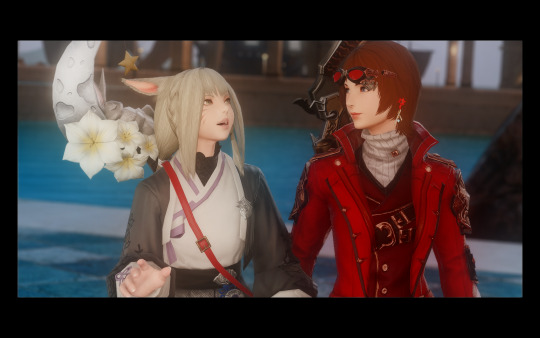
Do you ever just pick an EXTREMELY minor character up off the ground and go, “I’m going to make you integral?”
The girl on the right (in red) is my 1.0 WoL, Thalia, my current main’s predecessor and older sister. The girl on the left (with the moon staff) is Una Tayuun. She is a background character and 1.0 survivor that’s completely missable if you never talk to anyone in the Waking Sands.
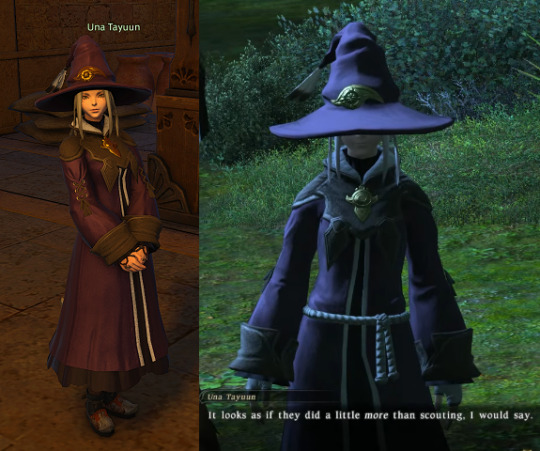
[readmore cut]
I got interested in her because I AM that person who talks to all of the npcs and of course noticed that she had the same weird amnesia that all of the other canon NPCs have about the 1.0 adventurers while also, apparently, being one of those adventurers or at least related to them.

(https://ffxiv.gamerescape.com/wiki/Una_Tayuun#Dialogue)
“Who was this character in 1.0?” I wondered. “what was she like?” but information about 1.0 is scarce and mostly lost. I would look it up eventually, I thought. But never got around to it... always held a fondness for her though. I have a soft spot for background characters that nobody talks about.
Then a few months ago I got the very silly idea to make a WoL fanfic. But before I could talk about my main, I had to think about his predecessor. Who were the people she would have known? who would have remembered her? What would be the significance of these relationships?
And eventually decided I really wanted to make Thalia a bigger part of the story than I intended, and start with *her* journey, in 1.0. We’re always saying we wish we could see the story of 1.0 right? What if I just novelized it! Simple.
...Well turns out that’s a bigger ask than I anticipated lmao, but. Trying to weave the unfinished and largely-retconned lore into the current storylines to make a cohesive (and hopefully interesting) narrative is the kind of overly-ambitious challenge that activates my dopamine receptors.
So wtf does this have to do with Una? Well, how do you make a story memorable? give your themes a name and a face. it’s not just the story of a world, it’s the story of a person, a life. and their relationships play a big part of that life.
Una has a “rough around the edges”, “IDGAF” personality. She talks like a lominsan (or just lowborn), curses, talks with her mouth full, she’s confident and a little abrasive. She’s an adventurer. She was a member of Minfilia’s Path of the Twelve. We’re not sure if she had the echo or not. She hangs out with a couple of guys who are kind of standoffish rough assholes. She’s a miqo’te seeker of the sun with a keeper of the moon name and she’s a conjurer. This is all we know about her canon, that leaves a lot of flexibility to fill in details. She’s just the right age (according to encyclopedia eorzea 1), and has enough presence to hook into the narrative easily.
Thalia is stubborn, impulsive, and fiercely independent. She has a big sense of responsibility, but at the start of her journey is very much rebelling against having an overwhelming burden of responsibility forced onto her. She awakens to the Echo at 13 years old which, in addition to the usual Echo things, gives her the ability to tell when people are being deceitful.
In 1562 of the 6th astral era, quite a lot of things happen. It’s when the world starts to really fall apart, though most people won’t realize it for many years. In the midst of all the Inciting Incidents(tm), Thalia gets into a huge argument with her mom and runs away from home.
She ends up in Gridania, where she meets Una, a novice conjurer. (still hammering out the details on how Una got there). They bond over them both being “outsiders” in a time when Gridania is, arguably a lot more insular and xenophobic than usual (which is saying something). Una appreciates Thalia’s direct approach to problems and unwillingness to do as she’s told, and Thalia appreciates how Una is willing to call someone an idiot to their face (and honestly likes having someone of her own age around for once). They are young teenagers and they are -so- annoying.
They’re friends for over a year, through a bunch of canon happenings, before the puppy crush manifests.
Around 1564ish, Thalia is 16 and Una is 15. They’re each-other’s first kiss. They start dating officially. They leave Gridania together, and Thalia introduces Una to her family (it goes...complicatedly). Then they go to Limsa Lominsa, which is a lovely place for two unaccompanied teenage girls, but there’s a new Admiral in charge and a bunch of -stuff- happening. They get into and out of so much trouble.
Eventually they start working with the Company of Heroes, and things get ... really, really complicated. Thalia is called more and more towards destiny by The Plot. A distance grows between them. Being a hero and being a good girlfriend aren’t always compatible.
In 1568, they get into a huge fight. They break up. They regret it later, but ... things get in the way. Time and distance and, circumstance.
Una gets a new crew. She joins the Path of the Twelve. She’s sad sometimes, regretting what could have been, but is the type to just keep moving forward and never looking back unless she has to (wounds can’t hurt if you pretend they aren’t there. ironic, for a healer).
Thalia runs with the Ironworks a while but it doesn’t stick. She has a kind of crisis of identity, and walls herself off from the world. She quits adventuring, gets married to a man she barely knows and has a baby, trying to fit herself into a mold and do what she’s “supposed” to do.
And then the damn moon starts falling. It’s 1572. Thalia has a 2 year old, she is not supposed to be in the field. But she *has* to be. It’s what she was called for. What she was chosen for.
Una, as a part of the Path and a longtime adventurer, is of course involved in...everything. They cross paths a time or two, but there’s little time to mend broken bonds in the middle of a pending apocalypse. And, well, Thalia’s married now. No matter how unhappy she seems, that isn’t Una’s place. Not anymore.
Still, they talk a time or two. Maybe if things were different, if they had more time...
It’s not to be. Thalia dies. Una dies too, much later, after (re)meeting Thalia’s little brother. A tragic story like so many others.
... but.
The events of shadowbringers, particularly 5.3 are very strange. Mass summoning across the rift. Many free-floating spirits, and unfortunate fallen bodies. Potentially, a few cracks in reality wide enough for some things to fall through. Or be guided through by a benevolent hand already shown as willing and able to guide souls between the shards. And with strong enough wills, who knows what might be possible?
1 note
·
View note
Text
My overall verdict is: it was cute! I had fun! Was it good? I'm not the boss! But I think maybe a little. Hope this helps.
Full thoughts below with spoilers, warning i am not sober and very sleepy
The good:
Elfman composition (despite his... situation... I'm a sucker for his work and overall vibe)
strong and cohesive visual theming and design
all of the actors played their roles well in my opinion but catherine o'hara was as usual as talented as she is beautiful (if you don't have a crush on her get help /silly) and dafoe's role was as fantastic as he is handsome. (is this getting old? should i stop announcing when I have a crush on an actor?? ... i'm going to keep doing it) keaton as beetlejuice is as silly, crude, and irresponsibly alluring as always.
I like the general vibe of the plots intermeshing in the film, I think the story about the living family was more compelling personally but i really loved delores and her aesthetic and her actress is beautiful.
the dedication to the surreal and macabre is awesome
The bad:
I'm not sure if I'm just being a hater today cause I feel icky and sleepy but the plot with the ex-wife felt... not great to me? I think it would've done better being explored in a spin off or standalone thing... As it stands, it felt like an unnecessary complication to allow them to shoehorn in a backstory. However, there's many moments that came off to me as intentional fanbait and this was probably one of them--I'm sure many people really liked this. I haven't seen any expanded media outside of the film so! YMMV.
The soundtrack felt inconsistent but I think I'm actually genuinely just being a hater on that one. (the funeral music was top tier choice though of course.)
I am not... huge on the whole thing with mr juice being fixated on lydia but i also get that her growth as a character is to stop tolerating men who want to take advantage of her... but i wonder if that should've been lydia's battle to begin with. this film, in my opinion, struggled passing the bechdel test. delores girlie i love you but you need to at least kill another woman until you pass.
i think my primary issue is that for me the plots largely didn't have a satisfying conclusion and felt kinda strung together. dafoe's role was a standout to me but i wonder if they felt he needed... more to do? maybe a cut of the film with all his good bits would've felt like "too much" without other justifying plots? i don't know, i don't know how writing works, i don't know how late stage big plot rewrites can be done-- im just thinking out loud.
finally, i think my biggest issue is that they consistently asked only if they could and not if they should. for me a lot of it hit as sort of as if they were throwing every single idea at the board and refusing to edit out anything. the pacing of the original was wacky but the pacing in this one feels very odd and disjointed as a result. in particular the wedding scene was very up and down for me lol. some bits lasted way too long but then it'd redeem itself but then wear on too long all over again lol.
final judgment:
i liked it quite a bit but i can't blame anyone who didn't like it lol. for me the second half of the film was more interesting but for others it's the other way around--which makes me question again if the plots should've been cut down to focus on resolving them in a satisfying way? idk! but the creepy-cute cartoony aspects make it worth watching on its own imo.
tl;dr: RIP bob u were a real one, I hope that the shrunken head dudes are frolicking in the fields finally free
going to see beetlejuice beetlejuice today. heard it Wasn't Good. Will update.
#im not a movie critic this is just going off immediate vibes#i tend to take awhile to digest and recontextualize movies so my take might change
5 notes
·
View notes
Text
Happy Anthesteria!
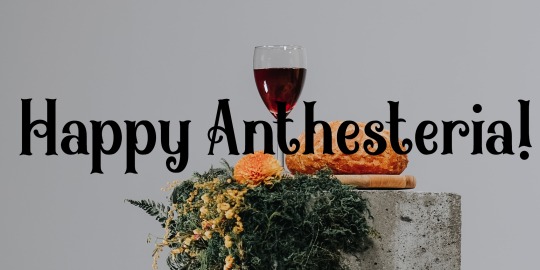
My goal towards festival recon is… largely recon, but there’s so little preserved about the what and why (particularly if it’s not from Athens, when we know there was a huge diversity of cultus). So, I try to take the main things we know and extrapolate from there into something cohesive.

Main Associations
Flowers
No surprise there, “anthos” meaning flowers. I live in a Mediterranean climate and the last week or two there’s been blooms everywhere, with the promise of more. Cherry blossoms. Wild flowers. Snow drops.
There are plenty “first of spring” holidays around this time, but that is much more tied to Persephone and Demeter (though there is some Orphic mystery-cult lore about Dionysos being Persephone’s son, but that’s too esoteric for me). What instead I celebrate is the promise of coming spring. There are blooms, but nothing is really living. It’s gloomy, foggy, cold, and perennial crops (including grape vines) are cold and skeletal.
First wine
Wine-making ain’t what it was a couple thousand years ago. Then, last year’s vintage would be ready about now, but wines now typically age for years and there’s no set annual cycle. Beer and spirits can be crafted any time.
This is, to me, the celebration of last year’s plenty, in the trust that new harvest and cultivation will come again.
Ghosts?
I’m unsure how to categorize that. The idea that the miasmic dead haunt us in a very Halloween-y way, during Anthesteria. They come to drink, to celebrate with their descendents, and be feasted before returning by Hermes Cthonic to Hades.
Why are the undead stomping around? How can this relate to Dionysos? He’s a divine of all three realms — born of a mortal mother, lifted to Olympos, and descended to Hades. Well… let’s move on a moment.
Heiros Gamos / Divine Marriage
Several Dionysian festivals have a secret rite performed “on behalf” of everyone else, to invite his blessings on the polis and land. In Athens, it was the ritual marriage of the archon’s wife to the god. Why? What blessings of Dionysos are needed?
I would argue that it’s fertility, specifically for the land but also for animals. Demeter is the goddess of agriculture and pastoral lands, but Dionysos a god of tamed wildness and transformation.
It is the marriage of the divine, to the dead earth, via a mortal.

Myths
Ariadne
There’s also a lot of versions, for such a short myth. The one I’m using is:
Ariadne helps Theseus navigate the Labyrinth, but is abandoned on Dia for her trouble. Brokenhearted, she drowns herself, and Dionysos raises her from the dead. Giving his consent, Zeus makes Ariadne deathless and she sits as Dionysos’ bride, crowned in the Cronos constellation.
Erigone
The wine-creation myth, always Dionysos-appropriate
In return for his hospitality and for love of his daughter, Dionysos gifts Erigone’s father with the knowledge of wine. He makes it. All the townspeople think they’ve been poisoned, and they butcher him. Erigone hangs herself in grief. Dionysos unleashes his wrath upon the people of Athens, until they honour Erigone and her father and establish Dionysos’ cult of wine.
Seleme
Seleme was Zeus’ lover and tricked by her pride to ask to see his true form. She was incinerated, naturally. Once Dionysos reached adulthood, he traveled through Hades to reclaim his mother and bring her back to Olympos, as Thyone, to reign with him and Zeus.
These three myths all have a common theme: death, before divinity. Something terrible happens, which is remedied by Dionysos in a massive personal and communal transformation. They also all happen to be women. Ariadne is the natural focus for a divine marriage, being Dionysos’ wife, if you’re uncomfortable invoking and playing that part.

Celebrations
Traditionally three days, Pithoigia (Jar-Opening), Khoes (Cups), and Chytroi (Pots). Condense into two, one, or celebrate all three.
Day 1 : Pithoigia
Traditionally, opening last year’s vintage, drinking, and sharing it with children and family. Like other Dionysos festivals, social order breaks down — slaves celebrate with masters, prisoners released from jail.
Day 2 : Khoes
While the rest of the populous continues to celebrate (Athens, in particular, celebrated a myth of Orestes and drank in silence), a sect performs the heiros gamos on behalf of the rest. Lots of fertility rites and symbols throughout the polis, including phallus, sex workers, satyrs, orgies, and penis-shaped cakes.
Day 3 : Chytroi
Due to the increasing miasma, cover shrines to hide from it.
After celebrating the ancestors and feeding them with cooked and honeyed grains, entreat Hermes to guide them back to Hades. Dionysos has brought them up, but his journey is one-way.
This is the day to honour Erigone and her father, particularly, but other deaths before transcendence. Tonight, Dionysos has accepted the offered heiros gamos (either by Ariande or a mortal woman), and is the God Who Comes.
My Plans
I’m actually gonna honour it today, tomorrow, and the next — February 14 to 16. Not least of all because of Valentine’s Day.
Day 1
I don’t have new wine to open, but I do still have the bottle of champagne that the realtor gave me and my husband when we bought the house. We don’t like champagne, normally, but the symbol is too good. We’ll open it to start drinking tonight.
During the day, I’ll decorate the altar with flowers and drink some in celebration. Also, feasting. That’s a festival thing, I think. We’re going to the same restaurant we went to for our wedding — a Brazillian steak house, so basically all-you-can-eat good steak. I’ll order wine with dinner. We’ll keep celebrating love/fertility/Valentine’s at home, complete with chocolate, alcohol, and sex.
Day 2
I don’t yet know if I can do heiros gamos sincerely. Probably won’t know until I’m doing it. If I decide I can’t, I’ll tell the story in ritual and leave off with Ariadne, alone and abandoned in Hades, and ask Dionysos to come to her. Might even try to make a penis-shaped cake, or something sexy, but this day and Day 1 are probably going to blend together.
Day 3
Cover shrines, and honour ancestors and heroes. Honour the half-dead world of contradictions — cold earth, green leaves, pink flowers. I don’t know where I read it, but I love the offering of giving Hermes an energy bar, because the idea is to give food to Hermes and the dead to give them energy on the hard trip back.
Once they leave, meditate on Dionysos returning as a stranger in the night and rising Ariande and Semele from the underworld. Mortal, and dead, and divine. Once he has accepted the marriage, I’ll finish the champagne with him in celebration.

How’re you celebrating Anthesteria this year? What’s your favourite Dionysian festival?
60 notes
·
View notes
Note
Do you have an opinion about Blaine’s character and how they changed him each season?
If this blog has proved anything, it’s that I can ramble, so here we go.
Watching Glee independently of fandom was... weird. There are a lot of times I delved into fandom after and saw some plot point that I’d loved and found a perfect culmination, actually considered out-of-character or some such. From what I can tell, S2 was such a huge point in-fandom and with fanfic that the fan interpretations of a lot of characters ended up superceding the characters as they were on the show (take Will Schuester getting retconned to Journey superfan in one episode, when in S1 Journey was sung because of its association to Finn when Will wasn’t leading the group, so the show was clearly aware of what I assume are fandom jokes esp in regard to Will not listening to the kids and willing to play it up, and it did seem to happen at a few points).
All that to say, with Klaine being as big as it was, I feel like Blaine got hit with that harder than most? How much was writers responding to some fandom-takes, how much was the televised version of the character departing from the fanon iteration, and how much was retconning is hard to say.
So, to go season by season.
Whoops sorry, yeah this is going on for a while.
Originally... Blaine didn’t really have much of a character? Season 2 was very bare-bones on the character front, they’d shifted the show’s focus to what was almost a sketch comedy at times so everyone was just one or two traits ramped up to insanity with little cohesion, Blaine existed solely in relation to Kurt, and he was ‘advice-giving gay kid, who’s less experienced than he lets on.’ (Like, he’s less sure of even his sexuality than Kurt). That was it. But I imagine this was also the time fanfic solidified him in a lot of people’s minds, when a lot of it wasn’t reflective of who Blaine was on the show? Especially with his minimal arc being presenting himself as more wise and knowing than Kurt, when at the end of the day this turned out to basically be an act/how he presents himself, and him being just as capable of misreading situations (Gap attack) as anyone. But if you read fic when you’d only seen him in his element with all the Warblers at his back and none of the layers being peeled back, I can see that messing with perception of him.
Season 3 defined him more clearly as a hopless romantic and a dreamer, both making more sense of his character, and fitting in with the themes of the show. The optimist who sometimes does questionable things in the name of that optimism, but trusts that things will work out well. Cliche views of sex, overcoming odds, romance... Which justifies his previous characterisation, though cracks start to show as he adjusts from being a big deal in the Warblers, to The New Kid. This carries on to season 4, where he faces he consequences of those aspirations, and acknowledges that switching schools for a guy is, well, a romantic idea in a storybook but kinda ends poorly in reality, following on from his alienation as well when the New Directions aren’t as in-sync with him as the Warblers were. Cue Blaine going from basically the head of a gay cult show choir in a private school with strict no bullying policies, in regular contact with his boyfriend, to alone in a homophobic less well-to-do school. He made the decision out of cheerful, unrealistic idealism, and it ended up the way it inevitably would.
Which is when the meta element comes in again. Blaine is definitely acting different in season 4, but he’s also existing in a different context. For me, at least, it felt like natural development? He’s the hopeless romantic who feels like he can’t relate to his boyfriend, because Kurt’s graduated high school and moved to NY, Kurt has a completely different life and set of life experiences to Blaine. Heck, the fact Kurt ends up in an open relationship in S4, while the end of his dynamic with Blaine was down to him sleeping with someone else says a lot. Post high school, Kurt’s development is necessarily supercharged because that’s just how life goes once you’re out away from home for the first time, S4 was admittedly too overstretched to fully justify it all, but the fact that the NY cast had to adjust to a massively different context was one of the conflicts of the season. Blaine, meanwhile, is still in McKinley. Still in Lima. Unsurprisingly, he lags behind, and feels that pressure.
Season 5 I guess is where we get weird? 5B, at least the New York stretch, follows on from the above well - post-graduation, Blaine is still the romantic, still tries for things with Kurt, and they definitely chafe a little to begin with when they try to completely jump into living together fresh after barely having gotten back together, and it clicks as a good follow-up to where they were. They have to get to know who one another are now, after massive transitional points in their lives.
5A is, okay, tricky. The proposal fits who Blaine was - the same guy that swapped schools for Kurt, the impulsive romantic - but after, Blaine gets a gimmick every week, but then every episode of 5A was a different gimmick every week (then again, the same can be said for S2 where Blaine originated so hey) so it’s hard to say much about character. You have him befriending Tina and Sam, with all the crushes there, some stuff I am not touching, but it sticks out as well that Blaine does tend to stick with what’s familiar to him. But yeah, this is the bit where it feels like Glee dropping consistency for set pieces and jokes.
S6 then sweeps in to conclude the arc. Obviously a big recurring element of Glee was characters finding themselves, deciding who they are and what they want to be, and Blaine gets matched with Rachel in this regard - he ostensibly gets a big success, but it doesn’t last, and he’s back doing nothing with no lodestone. So he does the same thing she does, and returns to his high school for the familiar atmosphere - and picks the school where he felt the most comfortable. One arc later, and his big song with Kurt for the finale includes the line “The daydream believer and the homecoming queen,” and I’m just assuming there are, like, a hundred klaine fics with that exact title.
Okay so, after all that. I don’t feel like Blaine necessarily changes at his core? At least for me, the arc’s easy to trace out - he’s a dreamer, a romantic, an optimist, who figures problems are easy to solve and that things will work out the way they do in daydreams. Reality challenges that at a few points, it hits him hard, and he loses both his Warbler-fame and Kurt and does start to spiral as Glee characters are wont to do. He definitely develops, but the core seems pretty consistent.
Glee is really consistent with making characters question what it is they want, and whether it’ll make them happy. Like, basically every character has to go through that arc and come to their own answers. Rachel has her Broadway dreams and ends up struggling with the reality, Quinn has basically everything in regards to what she perceives as the ‘proper’ way to live her life, Kurt has his Broadway dreams especially with the limited roles for his range of voice... For Blaine, his dreams hit a similar beat, coming with the storybook idea as to how his relationship will go, solving someone’s problems with a few words (with Karofsky - a failure), being the wise mentor, grand romantic gestures that end up being bad ideas...
Though I guess the oddities stick out more, with S2 and 5A as seasons with different focuses meaning you’re getting the same character in functionally a different genre which is always messy, and the vibe I get that fandom had a solid conception of who Blaine ought to be, before the end of S2?
This was probably too long a reply, but hey.
Overall, my opinion of Blaine is... relatively neutral? Which is no reflection on him - as much as I can make jokes about a lot of dynamics, I’m most attached to the characters after graduation just because, well, I watched the show as an adult. Unavoidably, they’re the ones I find more relatable. So barring characters with really solid inherent hooks (so, Quinn) I can enjoy the high school drama, but none of the characters immediately stand out to me - so Blaine works at a disadvantage with less than a full season’s length graduated. (Equally, to be honest, the seasons where Blaine felt like more of a presence, 2 and 5, were also my least favourite seasons, which definitely isn’t down to him but it does hurt his character, for me). I like his arc, Klaine is obviously fun, I like their dynamic as exes awkwardly navigating one another too sorry. He isn’t someone I hugely thought about because out-of-fandom he was a fairly secondary-to-tertiary character a lot of the time, but I like his development and he has some good arcs. I like how he goes full circle, from playing the part of a mentor in S2, to actually gaining the experience and confidence to fill that role by the end.
Thanks for the ask! And, er, sorry
12 notes
·
View notes
Text
I Hate the Alternate Ending of Blind Betrayal, and Here's Why!

DISCLAIMER THE FIRST: Massive spoilers for Fallout 4 abound. This post discusses Blind Betrayal, a quest with suicide as a heavy theme. Content warning applies.
DISCLAIMER THE SECOND: This post discusses cut OFFICIAL content from Fallout 4 that has since been repurposed into multiple mods. I am not criticizing any modders or their implementations of this content. Mods are fun and people can enjoy whatever the hell kind of game experience they want with whatever mods they want.
I am ONLY interested in discussing the original cut content as Bethesda had written it, and how it would have impacted the story and lore of Fallout 4.
So, yeah, it seems there was originally going to be another way to conclude Blind Betrayal (BB).
As described in this Kotaku article (citing this post by Tumblr user tentacle-explosion,) there are unused audio files of Danse’s dialogue that show an alternate ending to his pivotal quest. These lines are the only evidence we have of this ending (suggesting that it was cut fairly early on, as no other actors/characters seem to have recorded for it.)
From what we can tell, in this alternate ending of BB, Danse comes up with a possible way out of the sticky situation re: his identity as a synth. According to the Brotherhood Litany, he is able to challenge Maxson’s authority as Elder via combat. If you agree to this idea, you go with Danse to challenge Maxson. The Paladin and the Elder duel one another, Danse wins, and Maxson dies. Then Danse names the Sole Survivor the new Elder-- or with a hard charisma check, you’re able to convince Danse to take the job himself. It is unknown how the main plot would have progressed beyond this point, as there is no other evidence of what being (or influencing) the Elder would have been like or what choices it would have given you.
There is understandable disappointment in learning that this ending was cut. Choices in games are great, and it could have been fun to have multiple different options for how to resolve the quest. In many gaming circles, people complain that this theoretical ending is superior to the one we got and shouldn’t have been axed. The Kotaku article calls it a “way better” ending, and you’ll see many players lamenting that it wasn’t implemented, saying Bethesda was bad at writing for cutting it, etc.
So why did Bethesda get rid of the Elder ending of BB?
In December 2020, after the Fallout 4 Cast Reunion, Danse’s voice actor Peter Jessop answered questions in a private signing session on his Instagram. Peter Jessop is an extremely kind and gracious man, an avid gamer, and a huge fan of Fallout. During the stream, he reflected on the alternate ending and remembered recording the lines, but stated the content was ultimately cut because Bethesda decided it was lore-breaking.
Peter Jessop is right. Bethesda was right. The Elder ending of BB is a bunch of dumb nonsense. It sucks, I hate it, and I’m glad they got rid of it. And now I’m going to tell you why!
SIDENOTE: King Shit of Fuck Mountain
There is no wrong way to play a single-player video game. If you are having fun, then you are accomplishing the task for which the game was made. Good for you! Play it on easy. Play it on hard. Mod it. Speedrun it. Make up an intricate roleplaying scenario. Perform “challenge” runs. Kill everybody you see. Ignore the story and run around collecting wheels of cheese. Games are meant to be fun and there is nothing wrong with enjoying a game however you damn well please. This is especially true for RPGs like Fallout, which are designed with player freedom in mind.
There is an RPG playstyle I like to call King Shit of Fuck Mountain: a naked power fantasy in which your protagonist is the most powerful person ever, even beyond normal RPG plot significance. Through brute strength, incredible charisma, or having completed tons of quests for world-breaking artifacts and weapons, your character wields godlike influence, able to control people, factions, and the fabric of the world itself. A game enables KSoFM gameplay when it allows the player limitless freedom to gain as much power as they like with zero consequences to plot or storytelling.
A great example of this is the Dragonborn in The Elder Scrolls V: Skyrim. If the player chooses to pursue every questline in the game, one single person can become Harbinger of the Companions, Archmage of the College of Winterhold, Listener of the Dark Brotherhood, Nightingale and Guildmaster of the Thieves’ Guild, hero of the Imperial/Stormcloak army, the chosen one of like, 11 different Daedric princes, a bard, a Blade, and otherwise just, absurdly goddamn powerful in completely unrealistic ways. And that’s not counting DLCs. A fully-kitted-out Dragonborn is King Shit of Fuck Mountain.
There is absolutely nothing wrong with playing KSoFM if you like to. But I’m not a big fan of this style, personally. Sure, my first Skyrim character became KSoFM while I was figuring out the game, but after my first playthrough I preferred my characters become coherent figures in the story of the world. I pick one or two character traits and things that my Dragonborn is good at, focus on them, and make them part of some overall story. My honorable Imperial paladin werewolf is in the Companions, and hunts vampires on principle. My Argonian sneaky archer is a gleeful thief, but would never jive with the College or the Dark Brotherhood. I like creating protagonists who fit into these settings immersively. I don’t care about power fantasies or being in charge. I don’t WANT my character to be all-powerful, because that ruins my immersion and my little story.
Additionally, in a plot-driven story-focused game like Fallout, KSoFM tears the narrative apart. Skyrim is fairly light on story, so the Dragonborn can be the leader of the Companions and the Dark Brotherhood and whatever other factions without any of them noticing or caring. But FO4’s themes, faction drama, and the main thrust of the plot don’t work at all if the Sole Survivor is able to become too powerful or too influential. The Sole Survivor cannot become the leader of every faction, solve every problem, or eliminate every inconvenient bend of the conflict because it makes the lore of the entire setting implode. Thus, the game forces you to choose between factions. You cannot be with the Minutemen and the Nuka-World Raiders. You cannot be with the Railroad and the Institute. And you cannot become Elder of the Brotherhood of Steel.
So if you’re the kind of person who loves playing KSoFM, if you like plots that your character can “solve” with relative ease, or if you just think it would be super cool for your Sole to become Elder regardless of surrounding storytelling, then you might think the Elder ending sounds super cool. You are absolutely allowed to disagree with me here. Install all the mods and write all the fic and have all the headcanons you like. I respect that. There is no wrong way to enjoy a single-player video game. Have fun!
But if you’re a big nitpicky pedantic lore nerd like me, a fan of cohesive storytelling, or if you just want to hear how the Elder ending of BB absolutely fucking ruins Maxson, Danse, the Brotherhood of Steel, and the entire plot of FO4 from a narrative perspective, read on!
1. The Synth Thing
The Elder ending requires the stupid plot contrivance of the BoS forgetting about Danse’s synthhood.
One of the biggest problems with the BoS as an institution is their strict and dogmatic beliefs, which include a widespread dislike of non-human species. Perhaps more than any other non-humans, the BoS hates synths. Synths are, in their eyes, machines given free will, a violation of the sanctity of human life and the ultimate example of technology run amok. To them, synths are not sympathetic, they are not slaves, and they are not victims of circumstance. They are weapons that left unchecked will destroy all of humanity for a second time. Synths are anathema to everything the BoS stands for, and finding out that one of their most beloved and trusted Paladins is one is an earth-shattering blow to their integrity and sense of security.
It is completely absurd that the BoS would allow a synth within their ranks, particularly as they are waging war against the Institute, who created synths in the first place. It is even MORE absurd that they’d allow one to influence their Elder, or even worse, to become Elder. It completely undermines their mission in the Commonwealth, and the core tenets of their extremely rigid beliefs. No matter the Elder, no matter the Litany or obscure BoS law, no matter how valuable the Sole Survivor is as a soldier or how much influence they wield. Danse is a synth. He’s the enemy. He is physically the embodiment of everything they hate.
Not only wouldn’t they trust a synth in general, but the BoS specifically believes that Danse is an infiltrator for the Institute. Even Danse believes that he is a danger, that the Institute may be able to take control of him and use him as a weapon. Sure, we know none of this is actually true, or possible, but the BoS don’t know that. And given how quick they are to order Danse dead without even the possibility of surrender, I don’t think there’s any charisma in the world that’s going to convince them otherwise.
According to Peter Jessop, this, ultimately, is the reason why the Elder ending was cut. He talks about it around the 11:30 timestamp in his Instagram stream, linked above:
“We recorded an ending where you keep Danse alive and you take over the Brotherhood. But there was a question of content… there’s no way the Brotherhood, once they knew he was a synth, would let him be even the right hand of the person in charge.”
Bethesda correctly recognized the incredible narrative contrivance for the BoS to shrug off the reason they’re trying to execute Danse in the first place. Whatever other beefs I have with this ending conceptually, they all come in second to just what a big dumb leap it is to get beyond this first and most important problem.
2. The Complete Death of Conflict
The Elder ending of BB destroys the conflict of the quest, and potentially the conflict of the entire game.
Greed is a poison. There is no such thing as a perfect ideal or a perfect organization. Power corrupts. Humanity has the choice to build back better. War never changes. The Fallout games are full of themes, depicted by the characters and quests and factions we play out.
Blind Betrayal is rightfully praised as one of the most powerful quests in FO4. Not only is it well-acted, but it puts the player in a very difficult position. The BoS has given you clout and glory and free power armor and lots of firepower, but now you see the price: unquestioning obedience. You are ordered to execute your friend and mentor Danse for the mere fact he is a synth. Are you going to follow that unjust order? Are you willing to give up your principles on command? Or is this where you can no longer stay quiet and stay in line?
To be honest, I’ve always thought the fact you can talk Maxson out of killing Danse but still remain with the BoS in good standing was a cop-out. BB goes 90% of the way to forcing you to choose between a companion and a faction, and then chickens out at the last second to let you have both, if your charisma is high enough.
(I believe this has the fingerprints of Skyrim’s development on it-- Bethesda’s writers got nervous about doing another Paarthurnax choice involving the fan favorite Brotherhood of Steel. That’s right. Danse is the Paarthurnax of Fallout. Frankly, I understand why they chose not to go there, but damn, wouldn’t it have been wild? You want to run with the BoS? Then kill your friend and feel the burn. THIS is what it means to follow orders without question.
As for me, I’d pick Danse every time and sleep soundly without the company of shitty bootlicking dieselpunk LARPers- but I digress.)
Anyway, you know what would have REALLY been a copout? If the game asked you to make a difficult thematic storyline choice, and you solved the problem by just not choosing at all.
You are supposed to feel uncomfortable when Maxson orders you to kill Danse, because the game is telling a story about how it is maybe a bad thing to thoughtlessly follow orders without question. It is asking you to think about what the BoS is, what they are doing, and how they are going to run things, if you choose to let them “win” the Commonwealth. It is pointing out that there is no room for gray in the BoS’ black and white. That a good, loyal man may die because of the way he was made, through no action of his own. That soon, you’ll be killing other people on command. The Railroad. Fleeing Institute synths and scientists. Others, down the line. It all depends on who’s giving the orders. Are you going to follow those orders?
Eesh, that sounds thought-provoking and unpleasant and difficult! Let’s just skip it by killing Maxson and making ourselves the boss. Now we get to tell everybody else what to do!
It’s unknown what powers the Elder ending would have granted the player, or how it would have interacted with the other factions. There is speculation that you’d have been able to ease back on the BoS’ dogmatism, or change some of the later events of the game. For instance, perhaps you could talk the BoS down from attacking the Railroad, sparing popular characters like Glory and Deacon who must die in the normal BoS storyline. Perhaps you could have made the BoS a kinder, gentler faction and directed them to run the way you want them to.
If this was indeed the case, then the Elder ending would not only suck the gravitas out of BB, but torpedo the entire main plot.
If you can get rid of any and all downsides to siding with the BoS, why in the hell would players side with anybody else? With the player given total power, the BoS becomes a perfect faction with no drawbacks, no weaknesses, no tough decisions to be made. Screw slumming it with the Railroad or the Minutemen, let’s take over the BoS. Free power armor and a giant robot! Forget the whole intolerance thing, I hereby proclaim the BoS No Longer Problematic! Now to force all the factions to get along, completely removing all conflict and nuance from the plot!
That’s some real anticlimactic “tell Legate Lanius to go home and then he does it” bullshit right there. King Shit of Fuck Mountain!
Look, it might be nice if there was a perfect path like that to take through the game. It would be cool if our characters could be that powerful and the game was that tailored to our individual choices. On the other hand, “I change all the factions to suit my exact liking” might be a fun idea for a fanfic, but it’s an incredibly boring plot for a video game. “I get to make everything in the world exactly how I want it” is Minecraft, not a story-driven RPG with a complex and intricate plot.
It would be great if complex conflicts could really be solved that easily and effortlessly, but hey, you know what? War never changes.
3. The Assassination of Arthur Maxson (Literal)
Arthur Maxson’s death is too significant and fundamentally disastrous for the Elder ending to make any sense at all.
Hero, villain, leader, monster, tortured soul, brutal dictator, immature twerp, bearded sex hunk. However you personally interpret Arthur Maxson, there is no denying that he is a venerated, popular, beloved figure in the BoS. He is the blood heir of the organization’s founder, a powerful warrior, a brilliant tactician, and a charismatic negotiator. He is responsible for reuniting the East Coast BoS with the Outcasts, leading the new, stronger BoS with a sense of shared purpose. There is a damn good reason his name is Arthur and he named his ship The Prydwen, echoes of King Arthur and the legends of his glorious kingdom of Camelot. Arthur Maxson is so beloved that many view him as a demigod, a messiah sent to lead the BoS into a mighty and prosperous future.
So I’m sure nobody’s going to be upset when some wasteland jackass recruited a month ago stumbles in with a synth, kills him, and takes over his job. Right?
It doesn’t matter that it’s “honorable.” It doesn’t matter that it’s done “by the book” via obscure BoS rules. There is no codex or litany or rule so binding that it’s going to overcome the cult of personality around Maxson. There is no way that the BoS is going to accept the death of Arthur Maxson, a man whose reverence borders on worship, especially not when he is immediately replaced by a wastelander, or a synth.
The death of Arthur Maxson removes the unifying glue that’s been holding the BoS together since mending the rift with the Outcasts. Maxson’s death eliminates the one person that both sides of that conflict agreed could steer the organization in the right direction. Some level heads may try to keep the focus on the mission and the Brotherhood tenets, but Maxson loyalists will never forgive the new Elder for his death, and that amount of passionate righteous anger will not be quelled by appeals to the rules. The new Elder’s war on the Institute is basically over before it begins, when the forces splinter and start infighting over the change in leadership.
And this is if the new Elder lives long enough to actually give any orders. I give them around 24 hours after the duel before some angry Maxson loyalist “accidentally” pulls the trigger and “tragically” empties a clip into their back.
24 seconds, if it’s Elder Danse, the dirty synth abomination.
4. The Assassination of Arthur Maxson (Figurative)
The Elder ending of BB falsely pretends that Arthur Maxson is the biggest and only problem with the BoS.
In the Elder ending, as written, the conflict of BB is considered completely and totally solved by the death of Arthur Maxson. The core problem, that Danse is a synth and considered an enemy by the BoS, has not gone away. But by getting rid of Maxson, this apparently no longer matters. Nobody else is going to take offense to Danse’s nature or protest his presence. Nobody else is going to attack him or try to follow through with Maxson’s prior orders. Nope, that meanybutt guy who gave the order is gone, and everybody else is going to welcome Danse back into the fold like nothing ever happened.
I touched on this a little bit on an ask about Maxson a few weeks back, but a lot of people seem to believe that the FO4 Brotherhood of Steel is the way they are purely because of him. That he is the one making them treat non-humans as second class citizens at best, and enemies to be slaughtered at worst. That it’s his fault the BoS is so vehemently against synths and the Institute. That he is the one influencing their imperialistic tendencies, and treating the Commonwealth like territory to be conquered and people to be ruled over by their betters.
He’s not. That’s the Brotherhood of Steel, guys.
The charitable, altruistic, virtuous BoS that many of us met for the first time in FO3 were outliers. Lyons’ group was literally disowned by the rest of the faction because their kindness to wastelanders had gone so far astray from the “core” tenets. The BoS as a whole has always been exclusive, isolated, and seen themselves as “superior” to the average wastelander. They have long disliked or outright hated non-humans (and even Lyons’ BoS in FO3 use ghouls, feral or not, for “target practice” if they get too close!) The rigid dogmatism of the BoS is not something that Arthur Maxson started, but has always been part of their fabric.
Now, it’s true that Maxson is absolutely going hard on the BoS tenets, and extremely dedicated to upholding them. His BoS are the way they are and act the way they act because he believes that this is the way it should be. Is it possible that a different leader may be a little more flexible? Absolutely. Could a skilled Elder eventually show them the benefits of a softer approach and a more generous worldview? Totally. Is getting rid of Maxson and replacing him going to make that happen overnight, or going to make the rest of the BoS who supported him shrug and follow suit?
Nope.
Blaming Arthur Maxson for everything unsavory about the Brotherhood is unfair to him and also foolishly ignoring the deep, massive problems that are far older than he is-- problems that plenty of its members wholeheartedly believe are not problems at all. Getting rid of Maxson does not make the BoS kinder or gentler. Even pretending Maxson isn’t as personally beloved as he is, any new Elder who steps in and starts trying to fundamentally alter the way the BoS operates and what they believe in is going to face some major, immediate pushback.
Like, a full clip of bullets in the back type of pushback.
In the face if it’s Elder Danse, the godless freak of nature.
5. The Un-Redemption of Paladin Danse
Last, and my personal least favorite!
At first glance, Paladin Danse is a steely jackboot, a die-hard Brotherhood loyalist who fully and firmly believes in their cause. Many immediately dismiss him as a humorless brute, or completely ignore him because they think that’s all there is. But if you spend any time with Danse at all, you’ll notice a sort of weariness in him. He is tired, overworked, and his years of service are starting to weigh on him. He has watched friends, comrades, and mentors die in horrible and gruesome ways, and he suffers from PTSD. Though he has always been told that his own sacrifices, the sacrifices of his brothers and sisters have been” worth it,” he’s starting to question if that’s true.
After telling of the incident where he personally executed his best friend Cutler, who’d been turned into a super mutant, the Sole Survivor is able to console him:
Player Default: You did the right thing. Danse: {Somber} It's what I was taught. I don't know if it was right.
This line is an excellent summary of Danse’s entire character arc. He learns to question whether to believe what the Brotherhood has taught him, or to believe in himself. His gut feelings. His sense of justice and his own ideas of what’s right and wrong.
(In the interest of not turning this into an essay about Danse’s character, I won’t even get into how this also applies to his beliefs about his worth as a person. But keep in mind, that dimension is there, Danse just covers it up by making everything about the Brotherhood.)
During Blind Betrayal, after getting the orders to execute him and hearing Haylen’s plea for mercy, we may expect Danse to be ready to fight back or flee. But when you confront him in the bunker at Listening Post Bravo, he’s compliant and suicidal. Danse is so deeply poisoned by the BoS’ rhetoric that his own feelings or will to live don’t factor into the conversation. He demands that you follow your orders and execute him, because he believes, as the BoS does, that all synths are dangerous and must be destroyed.
Danse: {Stern} Synths can't be trusted. Machines were never meant to make their own decisions, they need to be controlled. Technology that's run amok is what brought the entire world to its knees and humanity to the brink of extinction.
{Confident} I need to be the example, not the exception.
Through various dialogue options, if your charisma is high enough, you are able to talk Danse off the ledge. He is able to consider, at least, that the BoS’ merciless judgment of him is wrong and that what he was taught isn’t right. He is a thinking, feeling, self-aware synth, and that makes him as much a person as any human. Danse is no danger to humanity-- and maybe, most synths aren’t either.
Danse is an example, not an exception.
Later on, if you manage to get him out of BB alive, Danse shows further acceptance of his nature. His approvals about synths begin to soften slightly (or many of them do, at least… it’s not perfect.) He is still struggling with his identity and reconciling it with his former hatred, but his dialogue suggests that he’s on the road to being more open-minded and understanding. Along with this, Danse learns that he has value as a person beyond the Brotherhood. He no longer needs to define himself with BoS beliefs or judge himself by how useful he is to them. He learns that he is worth caring about, worth being friends with or being loved because of who he is-- not what he is, in any regard.
[SIDENOTE: Many players, myself included, are frustrated that Danse’s arc leaves off sort of midstream there. Due to the open-ended nature of the game, we don’t get a real conclusion to his arc-- even though much of his idle dialogue doesn’t change and he still espouses pro-BoS sentiments ( an unfortunate by-product of writing for a video game) there is every indication that he’s started down the right path, but understandably has a ways to go.
Also, Peter Jessop agrees with us.]
Meanwhile, in the Elder ending, Danse doesn’t get a redemption. His entire character arc, actually, hits the skids and does a total 180.
He never leaves the BoS. So scratch the need for Danse to ever think about himself as separate from them. He never needs to question what they’ve taught him or whether they’re right or wrong. He never needs to find any worth in himself beyond his use to the BoS. Why would he? He might be the Elder. The BoS is all he needs to care about anymore. The BoS is all he ever needs to be, ever again.
And I think, most horrifying of all, this Danse never needs to change his mind about synths. On the contrary, one of the surviving dialogue files includes Danse’s speech to reassure the rest of the BoS of his stance:
Danse: I want to make one thing clear to everyone. This body might be synth, but my heart and mind belong to the Brotherhood. The Institute is still a tremendous threat to the Commonwealth. They possess technologies that need to be confiscated or destroyed. And even if that means I have to pull the trigger on my own kind, I’m willing to make that sacrifice.
Elder ending Danse doesn’t grow more understanding on the nature of synths. He doesn’t accept that synths are people, or anything more than technology run amok. He won’t even accept that for himself. Elder Maxson wasn’t wrong about synths-- they’re the enemy and they need to be destroyed.
But, see, he was wrong about Danse. It’s okay for Danse to exist in spite of his nature. It’s okay for him to never fully accept his own personhood, and to outright deny it to his kind. Because his body is a machine, but he’s different from the rest because his heart and mind belong to the Brotherhood.
He’s the exception, not the example.
CONCLUSION:
The Elder ending of Blind Betrayal is dumb, contrived, stakeless, character-derailing powergaming crap at its finest and I’ll happily dance on its grave.
People give Bethesda a lot a shit for their writing-- whether it be stuff they left out, stuff they left in, or stuff that they never, ever could have made work due to the limitations of writing for a video game. Plenty of it is well-deserved, or at least worth a discussion. But from the minute I found out about its existence, I have always wanted to extend a congratulations to Bethesda for cutting the alternate Elder ending of Blind Betrayal. It was a good choice. A very good choice to cut a very dumb plot that would have fundamentally altered the story they were telling, and characters that I’ve grown to love. I think the writers deserve some credit and a hearty handshake for the wisdom of this decision.
Now as for why Nick Valentine isn’t romanceable--

#fallout 4#fallout meta#paladin danse#arthur maxson#blind betrayal#this one was a long time coming#any thematic resemblance to any fics of mine is a coincidence#the blind betrayal manifesto#king shit of fuck mountain#the initial intrigue of the idea wears off if you think about it more than not at all
299 notes
·
View notes
Text
02 as a story about relationships, and the value of “guest characters”

02 is, first and foremost, a story about relationships between people; it is not a story about the individual, and it has never been a story about the individual.
I cannot emphasize enough how important understanding this concept is to understanding 02 itself, to the point where I might even say something as extreme as insinuating that not taking this into account means risking having the entire point of 02 go over your head. Not only has it been outright stated by official (multiple times, at that) that this is a point it intentionally was made to contrast with Adventure with, you can also even see it in the evolution gimmick (Jogress) being about people connecting with each other. It’s an important point to make in general, too; as long as we live in a world with other people in it, how we reach out to and connect with others is just as important of a personal character trait as how we deal with ourselves. This is one of 02′s most standout qualities, especially in contrast to other Digimon series; it’s the theme that sets it most apart from everything else.
I’m writing this partially because I felt I should touch on it in general, and partially because lately I’ve been hearing sentiments about how introducing the new upcoming 02-based movie with a “guest character” instead of the 02 group itself is somehow doing said characters a disservice. I touched on this a little earlier, but to be honest, as someone who personally loves 02 very deeply, this take unnerves me a lot (and, predictably, comes very often from people who don’t even care for 02 that much; seriously, it’s a bit unnerving to hear these kinds of sentiments acting like they care about the series’s welfare from people who never cared for it in the first place). So here’s a post about the importance of “relationships” in 02′s narrative overall, and how “guest characters” tend to play into this.
“Relationships” within 02 itself
I admit that this is probably a bit harder to tell if you’ve only seen the American English dub, due to a lot of dialogue changes that make it ambiguous as to how much some of the kids like each other (that each and every member of the 02 group has almost unequivocal adoration and respect for each other at basically all times is not even remotely ambiguous in Japanese), but the intimacy between the members of the 02 group is one of the most notable things about it, to the point that it stands out even among the rest of the franchise. You can even see this trend reflected in official key art and fanart; depictions of the 02 group often reflect physical intimacy between the characters (linked arms, huddling together) and a strong sense of the full group hanging out together in a cluster. The observation that the Adventure group generally is in need of a reason to get together outside Digimon-related incidents whereas the 02 group hangs out with each other simply because they like it has been pointed out by many people around the world for years, and it probably wasn’t until Appmon (all the way in 2016!) when the idea of a cohesive group of this size all hanging out together regularly, purely for social reasons, came up again. Take any two characters from the 02 group and you’ll already be able to say a ton about how they’d likely treat each other; that’s a pretty huge accomplishment for a full group of six!
Because the whole concept of “human relationships” is so important to 02, it’s additionally essential in understanding the question of why the protagonist at the forefront of 02′s narrative isn’t Ken, whom the story can somewhat be said to be mostly “about” (in terms of his fall and recovery being relevant to almost all of the major story beats), but rather Daisuke. Of course, now that we’re all adults, I think most of us have experienced a lot more narratives where the line between “the character central to the narrative” and “the protagonist whose primary viewpoint the story is seen from” is very blurred (the currently running The Case Study of Vanitas is having a ball with this), but, nevertheless, Daisuke is the protagonist primarily because his way of approaching others and his philosophy of action is vital to the story 02 itself wanted to tell. (It’s not because he’s the “leader” of the group, because he isn’t really.) It’s also important to note that the narrative isn’t necessarily endorsing that everyone should be exactly like Daisuke -- after all, part of the reason he’s able to do what he does is because he has the other five kids with very different personalities complementing him -- but rather, it puts focus on the fact he’s able to have such a huge impact on others, and his relationships with the others that move them forward.
02 often gets an accusation of having characters that “don’t change throughout the narrative” or “have little/no character development”, which is an accusation that really isn’t true at all and has been easily turned down by anyone who’s actually bothered to sit down and think about the series in the last few years. Part of the problem likely comes from 02′s unfortunate penchant for subtlety -- its characters are fleshed out over an entire 50 episodes and their behavioral changes not spelled out for you in explicit words, so you have to actually pay attention and note the differences, and a lot of people seem to have just let it go over their heads and claim that it means nothing actually happened. (In fact, I’m about to whip out what may seem like a heathen statement to many: I never personally felt that 02 and Frontier ever lacked much in the way of character writing nuance compared to Adventure and Tamers respectively; it’s just that they didn’t happen to spell it out and hand it on a plate for you. Just because they don’t explicitly say it doesn’t mean it isn’t there!)
The bigger problem, however, is that people keep trying to analyze 02 through a lens built more for Adventure -- that is to say, one that was never meant to fit 02 in the first place, because that’s never what it was meant to be about. It's frustrating to see people go "Daisuke has no depth as a character!" just because they were expecting some kind of Crest-like epiphany mid-series where he speaks about all his individual flaws and how he overcame them, instead of simply just looking at the difference between how Daisuke behaves and interacts with others in episode 1 versus episodes 45-50 (and it’s huge!).
In fact, every single major character arc in 02 is better defined not by “how each character is individually”, but rather “how they interact with and form relationships with others”. Taking it character by character:
Daisuke: Yes, he’s explicitly referred to by official as a character who didn’t change much (...compared to Ken, anyway, which isn’t actually saying all that much). And, to a certain degree, that’s true; his fundamental attitude didn’t change a lot between episodes 1 and 50 of 02. What did change, however, was how he approached others and how he asserted himself; he spent the early episodes of the series running around in circles and deferring to others, and slowly developed into someone who became more assertive about his decisions and confident about supporting others. So it’s not about whether his fundamental view of the world changed; it’s about the fact that he initially started off as someone who, thanks to his abysmal lack of self-awareness, wasn’t able to get much done at all, but eventually accepted the support and validation from his friends to become a pillar supporting everyone and pushing them forward.
Ken: Ken’s shift in “morality”, when he decided to stop being cruel and to try and make up for his mistakes, happened abruptly in 02 episodes 21 and 23. The part about his own fundamental approach to life happened there; it didn’t need any further changes after that point! What did change, however, was that he was drowning in regrets, self-hatred, and keeping distance from others at that time, and, thanks to Daisuke and the others, learned to accept the support of others in order to move forward with his life. In terms of “doing good”, that was already long past him! -- but accepting the others into his heart and getting to the point where he could hang out cheerfully with them without restraint took much longer.
Miyako: Even from the very beginning, Miyako’s character was based on “going out of her way to dote on and help others” (it is very misleading to look at only her profile qualities like “good at computers” and reduce her entire character to that), and on top of having a penchant for panic and causing trouble for others, she also had a complex about panicking and causing trouble for others, often being the first to criticize herself for her own behavior and negatively comparing herself to others like Mimi and Hikari. It’s during the second half of the series when she starts to channel those qualities into being able to reach out to others and check on their emotional needs -- especially Hikari, who was so closed-in by default that Miyako’s aggressive tendencies were vital in reaching out to her -- and thus becomes someone who can properly support others in the way she wants.
Iori: The beginning of the series had him inflexible in thinking to the point others find it difficult to deal with him (although they certainly try) -- and to the point where he blocks out anything he sees as intolerable, most infamously when he’s initially the most cold and unforgiving towards Ken. His interactions with trying to figure out Takeru’s complicated nature help him open his mind towards acknowledging Ken’s position and desire to make things up, and overall, his observations of the complicated nature of the human heart help him understand others like Oikawa better -- something he would not have been able to do at the beginning of the series at all.
Takeru: The seemingly “cheerful” Takeru started off with a lot of horribly repressed emotions he wouldn’t admit and a penchant for being evasive, meaning that it was initially difficult to tell what his real intentions were -- causing Daisuke to get set off by him in the early parts of the series, and causing himself problems when he almost alienated Hikari (02 episode 13), Daisuke (02 episode 11), and Iori (02 episode 19) during some poorly-timed fits of anger. Iori reaching out to him allows him to finally be a little more straightforward and communicative, even about heavier topics, and understand the need to communicate with others in such a way.
Hikari: Her closed-in nature caused her to never truly speak her internal feelings to others nor be willing to ask others for help, giving others a poor scope of how to connect with her and causing her to develop a feeling of resignation that she couldn’t do anything to help herself; thanks to Takeru’s efforts in 02 episode 13 and Miyako’s efforts in 02 episode 31, she became able to more concretely voice calls for help when she needed them, stop resigning herself to her fate, and in general be able to speak her thoughts more assertively.
See the pattern? All of the initial major conflicts have to do with difficulty with connecting to others, or having a hard time accepting others’ support; over the course of the story, the kids end up changing in terms of how they interact with others, how they’re able to support others, or how they communicate with and interact with others. It’s not a development of one’s sheer fundamental qualities, but a development of one’s place in the group and their capacity for forming relationships.
Hence, when you look at Daisuke -- someone who has virtually zero self-awareness and puts all of his energy into supporting others -- thus comes the answer as to why he’s the protagonist of this narrative! This is the philosophy that everyone in the group is guided towards by the end of the story -- becoming people with empathy for others and a desire to support them, working to understand others’ feelings, and helping them get through their troubles. All of them have their own different ways of going at it, but, ultimately, “the importance of being able to connect to others” is one of the core principles of 02 as a series.
The importance of “guest characters”
So, speaking of the concept of “guest characters”, and the accusation that including one in the new movie will supposedly lead to an inevitable shafting of the 02 cast: well, first of all, let’s get on the table that this concept is hardly new to this franchise, nor even Toei series at all. It’s very common for theatrical movies to get these -- namely, Wallace in Hurricane Touchdown, Kai and Minami in the first Tamers movie, Bearmon and Kotemon in the Frontier movie, Rhythm in the Savers movie, and, most recently, Menoa and Imura in Kizuna -- because this is an opportunity to cover territory that would overcomplicate a full series. I have to emphasize that this is the same for Kizuna as well; even though it certainly was a very loaded 95 minutes due to having to establish so much in such little time, in the end, it was only a 95-minute movie. Theatrical movies are short stories, and shouldn’t be seen as anything but short stories; it’s kind of uncomfortable to see people have such high expectations of them in terms of carrying a series-tier narrative. It’s quite the opposite; these kinds of movies are taking advantage of the shorter format in order to cover territory that would be troublesome for a stretched-out one.
So yes, when “guest characters” don’t leave as much impact as the primary series characters, that’s, uh...well, that’s kind of the point. You’re not supposed to be giving them the same weight as the main series characters, because their entire existence comes from exploring possibilities that are only doable in short narratives! Wallace was a character whose whole appeal comes from the fact he’s a chaotic vagrant with unpredictable behavior and not much of an ability to commit to anything, so his character suits a one-off movie (and later drama CD) far better than it would suit being a regular in an ongoing series. Wallace, Kai, Minami, Kotemon, Bearmon, Rhythm, Menoa, and Imura were never, ever intended as characters that you had to put on the same level as the series regulars; they're just there to introduce new backgrounds and concepts to the existing setting, shake things up a bit for the sake of the short story, and show off what the regular characters can do in an unfamiliar situation. (In fact, you could say that Menoa is basically responsible for briefly introducing 02 thematic concepts to the Adventure cast.)
However, to me, the really baffling part about this discourse about how a new character would be “shafting” the characters in a 02 movie is that the 02 group is the exact kind of group that benefits best from the presence of this kind of character.

Let’s put it this way: When you look at Daisuke, what moments brought him closest to his emotional breaking point within 02 canon? Personally, I’d say his top moments are:
Hurricane Touchdown, openly crying over Wallace’s plight and empathizing with his situation even when it wasn’t supposed to be his problem (for those coming only from Digimon: The Movie, please note that this scene was very heavily altered from its original context) -- this is the only time in 02 canon, as of this writing, when we see him openly break down in tears
02 episode 26, when Daisuke agonizes about the fact Ken’s on the verge of suicidally throwing himself into a reactor in an attempt at penance (I don’t know how much this was kept in other dubs, but Kiuchi Reiko’s voice performance makes it pretty obvious Daisuke’s on the verge of tears)
The Door to Summer, when Daisuke is also pushed to the verge of tears seeing Nat-chan suffering and trying to reach out to her
Remember that Daisuke has basically no sense of self-awareness, and said openly in 02 episode 49 that he doesn’t have anything to worry about in his personal life. But that’s in his own personal life! In said episode, he also expressed that he was personally offended by BelialVamdemon trampling on others’ feelings, and if you want to go three years prior to Adventure, Daisuke’s own core motivations were stated in the Adventure novels and Spring 2003 to have been originally based on “frustration over not being able to protect others”. Daisuke may not have too many of his own problems, but when someone else has a problem, he makes that into his own problem -- he cries over them, is pushed to emotional limits empathizing with them, and is frustrated and angry with himself if he fails to help them.
In other words, all of the moments where Daisuke is seen at his best are when he’s interacting with and supporting others. That is where Daisuke’s potential as a character lies -- and it’s also tied into the rest of the group in 02 as well! Look at all of the moments of the most tense drama in 02, and what pushed each character to the limit; it was often to do with empathy for others, in the form of things like pain over hurting others, frustration over being unable to understand others, frustration over being unable to help others...
In fact, when you say “02 was a lot about Ken”, this is technically a correct statement, but it’s not so much about Ken himself as much as Ken in relation to the others. The entire second half of 02 was basically a “test” for the kids in terms of dealing with an “outsider” like him -- having built up a reasonably strong group dynamic already, what would it take for them to understand and reach out to someone who wasn’t from their neighborhood and had spent a whole half a year antagonizing them? Many of the episodes between 02 episodes 25 and 38 are really not about Ken himself to begin with (he spends a lot of time hanging around and being helpful, but not always much more than that), but rather about the rest of the group struggling with their own feelings regarding him and debating over what to do with him. That’s why the order and circumstances behind how they accepted him really say a lot more about them than they do about him (Daisuke is open-minded and forward-thinking, Miyako’s a bit more emotionally sensitive but is roughly just about as much, Hikari and Takeru are overly cautious and hesitant about their approaches, and Iori had to go through a whole journey of self-examination in how he approached others).

So in regards to this movie, we happen to have introduced this movie right off the bat with...none of the actual 02 characters. Daisuke still narrates the trailer and talks about meeting the person in question, so it’s pretty obvious that there’s still some tie to said characters, and V-Jump still uses the words “the 02 group is in a leading role”, so it’s pretty apparent that at least some of our favorite characters are going to be involved...but they’re not put front and center, and instead our very first promotional piece of art has someone else entirely, which is something official outright wants you to pay attention to.
Now, of course, I know as much about this movie as the rest of us do, so I’m not going to necessarily make any hard speculation about it either. I can’t tell you what role the 02 group would play in it, or which characters are even going to be involved beyond (presumably) Daisuke and V-mon. However, the mentality I just can’t get behind at all is the idea that this treatment of them is “shafting” when being in support roles is literally what the 02 group specializes in. And, on top of that, tying into what I said about the disparity between “the protagonist of the narrative” and “what the story is actually about” -- even if this movie decided to go as far as not even making the 02 characters the “protagonists” of their own narrative, it’s in fact possible to show off a lot about them without doing so.
The definition of what the 02 group was aspiring for in 02 itself was, simply, “happiness”. Like, for instance, a Christmas party where even getting to laugh was such a big deal (02 episode 38). Or aspiring to simple dreams even when they don’t involve high expectations (02 episode 50). One of the biggest, most major differences between them and their seniors was that what they lacked in “productive competence” compared to their seniors, they made up for in emotional support. Their major accomplishments and specialized skillsets aren’t really incredible compared to their seniors if we’re just talking about Digimon battling or something, but in terms of being positive and uplifting? Unparalleled.
In other words, if you want to show how far the 02 group has come, and their capacity for emotional support, introducing an external factor like a new character is one of the easiest ways to do it. If all they wanted to do was cash in on the 02 characters’ names and faces, and therefore put them in front as if they’re the only characters driving the story, I’d conversely be really worried, because it would make me wonder: what kind of territory are you trying to cover with them alone? In something like only 95 minutes (or maybe even less, since we don’t even know how long this movie is going to be)? There’s not a lot of good ideas you can come up with if your range is so narrow! 02 itself was a story with the kids contending with a lot of external factors -- the conflict between them and Ken, and later the conflict between them and Oikawa, and the conflict between them and the Dark Seed children who were suffering in their own way. The series even had its own “guest” factors like Michael or the other international Chosen to shake up the status quo every so often! It was never a story about them dealing with things within themselves, but rather trying to figure out their place in a huge world, and dealing with problems both internally and externally. You could get away with a self-contained story that centers almost entirely on introspection and self-improvement if this were about Adventure, where that kind of thing was part of the story itself, but 02 doesn’t work that way at all.
So, again -- the part that eludes me is how this apparently constitutes “shafting”, when an element like this is outright expected, or perhaps even required, if you want to bring the most out of 02′s themes and what these characters best specialize in. I understand that past experiences have tended to make people a bit suspicious of how these characters are treated and whether someone’s secretly out to get them, but reasonable worry is a far cry from the sheer concept of having a focus character outside their group being taken as such an alarming sign of them being sidelined, especially when this is the exact kind of situation that they conversely operate best in. An unfamiliar factor like this is exactly the kind of thing that would put their emotional mettle and supportive capacities to the test, rather than trying to show those off in a context where everyone already has known each other deeply for eight years!
Again, I know as much about the movie as the rest of us do, and as we find out more about it maybe there’ll be things to be worried about, but in terms of this apparently being evidence that the 02 group is in for a bad time: as they say, this just isn’t it, guys.
88 notes
·
View notes
Text
Thoughts on the new Cure designs
Overall:
I was not a huge fan of the designs when the colouring book pages leaked, there’s something about the face styles that doesn’t really work for me. So far none of the main girls have managed to spark the same kind of excitement in me the Star Twinkle or Tropical Rouge girls did with their profile images.
The designs are too different from each other to be a proper team for my taste, though we haven’t had a proper themed team since HapiCha so I probably should expecting to get one at this point. I do like that everyone has the same apron and the huge ribbons also tie them together a little, which is more that could be said for Tropical Rouge. Someone also pointed out that one of them has spoon earrings and another has forks, but unfortunately it’s unknown if the third one completes the set with knife earrings. Finally, nice heart highlights for the hair.

Cure Precious doesn’t do much for me, not a huge fan of the hair either in terms of colour or cut, it feels like the rest of the design drowns in her hair. Though the chibi-usa cones are nice. The dress itself is closer to the more generic magical girl look than the other two (which I believe is often case with the pink girls) but it also feels the most like a cohesive outfit out of the three and not unrelated ideas inserted in the same design. The most unique idea is the rope ribbon that ties behind her, plus the weird shoes.
I like her hair colour and the design of the clothes for her civilian look, the dress is really cute and goes well with the vest, but I’d prefer if the colour palette was more interesting.

Personality-wise Cure Spicy is my fave so far. Also best hair, multicoloured hair is always a good idea and that weird hoop would place her on my top 10 dumbest Cure hairstyles (I really like dumb anime hairstyles). Though multicoloured hair on just one character feels a bit off, I’d prefer if this was something everyone had, but then again the Cure designs haven’t been a proper themed team in almost a decade so it’s not this design’s fault specifically.
The outfit is a bit of a mess but has a lot of elements I like too, especially the dark tights and the “corset”. The skirt is unique but doesn’t go too well with the rest of the outfit, and overall the whole design makes me think of something like a circus performer which clashes with the character description on how she’s supposed to be the quiet one.
I like the darker palette of the civilian clothes and the overall look is pretty unique for Precure (or I guess Minami could wear this too). I do wish there was some kind of unique detail here though; the different items go well together but there’s nothing that makes the design that memorable.

Cure Yum-Yum takes the title of the dumbest Cure name in the franchise. Her design is a bit all over the place, like it feels a bit like the dress and the back ribbon come from two different designs, and the decorations on her head don’t go too well with either. Regardless I still kinda like this, I’m always a sucker for stripes and the skirt has a unique shape. Also cute footwear and best colour palette out of the three.
I really like her civilian form braid loops but otherwise her civilian look is pretty forgettable and apart from the braids her hair looks too much like Nodoka’s.
#precure#precure spoilers#delicious party precure#Delicious party precure spoilers#hapuriainen bitches about children's cartoons
41 notes
·
View notes
Note
Beyond disappointed in Ted Lasso. What were they thinking?!
The writing is a complete betrayal and insult to Rebecca’s character and Hannah’s skills as they’re being seriously underused. It’s also insulting Sam’s character.
Hoping someone pulls Rebecca’s head out of her ass tbh. Sam shouldn’t be getting caught in the crossfire of her looking for romance. I know he showed up at her doorstep but she still should’ve turned him away, and not even messaged him in the first place.
Hey, I'm with you, Anon, though we do seem to be in the minority. Sam is definitely not blameless here, he is also in the wrong. But if one of them is more in the wrong, it is Rebecca. I can't speak to whether her head has left her arse as yet because I have quit watching (at least for now). I hear she called it off with Sam in the most recent ep, though not because of any major crisis of conscience or because anyone in her inner circle expressed any reasonable reservations in response to her bad behaviour. And to be honest, I'm not sure we should need to hope and pray that Rebecca's precocious god-daughter, her slimy ex-husband, or the brutal British press will act as a moral compass on this ill-advised relationship. Both Rupert and the press have been set up to some extent as the villains of the piece. And a 14 year old should never have to school her elders on what is and isn't acceptable. Nora's needs have already been neglected by Rebecca for far too long.
If a moral position is to be taken on this, it needs to be taken by the show (because stance matters) and/or by its characters. But the show has for the most part depicted this relationship as ill-advised but ultimately hot, sweet, funny and romantic. As for the characters themselves, Sam has shown at least once that he has some moral backbone but seems to be adorably clueless when it comes to fucking his boss who keeps trying to set boundaries with him. Meanwhile, Rebecca's whole arc in s1 was about learning not to misuse her power for her own selfish ends. In season one, she misused her power within the club in order to exact revenge. In season 2, we have seen her misuse her sexual power, though I still cannot see to what end. I'm a bit at a loss as to what exactly she gets out of this 'relationship' but then I'm a grown woman so I have absolutely no interest in sleeping with a Harry Potter enthusiast barely out of his teens. I couldn't think of anything less sexy and more ick. I was certainly hoping for better character development for her this season.
As to what the writers were thinking, obviously I was not in the writer's room, but I would guess that they were thinking that any drama is good drama, people are stupid and fan devotion will trump any meaningful critique. In other words, they were thinking exactly how every other television writer thinks, despite the fact that this show posited itself as 'not like other TV shows'. This, to me, is where the blame really lies. Not with the characters or with the actors who are doing their best to sell this ludicrous turn of events. It must be noted, however, that both actors were completely blindsided by this relationship that had supposedly been so cleverly foreshadowed. Newsflash: if the people actually living these stories did not see this coming then you haven't foreshadowed shit. Sure, there were a handful of people that paired Rebecca with Sam but this does not constitute proof either. Fans have free-range to imagine and re-imagine characters. In some cases this may extend to imagining relationships between characters who have barely, if ever, interacted. There may be little to no evidence that these characters have even clocked each other's existence and some fans will still ship it. The existence of a handful of shippers does not legitimise such a problematic and divisive plotline making it onscreen.
But wait!, you might argue, this may not be a case of a popular show seeing just how far they can stretch fan devotion. This may not be a case of fan service to a handful of shippers. After all, the creators mapped out the entire three-season arc of Ted Lasso before they even pitched it to Apple. This was their brilliant plan all along! To which I would say: then maybe they should've rethought their second act based on people's strong reactions to their first. Ted Lasso was touted as the show we all needed in 2020. The writers and creators have all marveled at the chord it struck considering it was conceived prior to the pandemic and all the chaos it wrought. And while there is something to be said for having/sticking to a creative vision, there is also something to be said for being flexible and responsive to your audience and the cultural zeitgeist with which you're engaged. Season 1 of Ted Lasso told its story so gently, without creating distrust, division or unnecessary anxiety. It did not treat its audience like a gaggle of stupid lemmings to be led over a succession of narrative cliffs. THIS is what I mean when I say the show has broken with its brand. And look, this whole dark forest thing would be okay if the narrative arc was as well-crafted as s1. Season 1 gave us meaning, cohesion, comfort, sense in a senseless time. It was an almost perfectly crafted season of television. And I kept the faith for 6 episodes, despite the first half of s2 being pretty damn wobbly. But the follow-up to this stellar debut has been less than extraordinary so yeah, perhaps they should've thought a little harder about what made s1 so special before throwing it all out the window.
But wait!, I hear the faithful say, you don't know how things will pan out yet! Wait until the season is over and everything will make sense! But -- wearily and once again, I say -- we should not need to wait until the end of the season to understand what the hell is happening. By this point (over halfway through the season and show) we should have a v clear idea of the show's themes and the characters' arcs. And tbf, from what I can tell there are some fab things happening in other aspects of the show that I wish I could watch and enjoy. But my biggest fear at this point is that they are going to use Sam to solve Rebecca's childlessness. That, like Rupert (because the parallel cannot be avoided), she will become pregnant with a young fling and the show's attitude to this relationship will ultimately be: oh well, it was a bad idea and didn't work out for them but it was all for the best in the end cos who can be mad about a cute lil baaaayyybbbeeee??!! If they do go down this path then I will definitely be abstaining from the rest of the show. I will simply recall my repeated viewings of s1 with fondness tinged with regret at just how badly they fucked up a good thing.
Ultimately, Anon, I think this may be a case of there simply not being a diverse enough perspective in the writer's room. I am not saying that every single woman or every single person of colour will necessarily object to this relationship. I am simply saying that women and people of colour will be more sensitive to the issues of gender and race that are relevant here but that have not been fully or sensitively acknowledged in the writing of this plotline. Neither am I saying that Rebecca is the first woman to sleep with a man much (much, much, MUCH) younger than herself or indulge in an ill-advised relationship. But the comparison with Rupert both works here and doesn't because Rebecca is not being written like a white woman, she is being written like a white man. Realistically, only a white man can engage in this kind of hugely imbalanced relationship seemingly without any major moral qualms or societal ramifications. Not to put too fine a point on it, but this kind of relationship is reserved for all the Bills and Joes and Brendans and Jasons out there -- not for the Rebeccas and definitely not for the Sams. We are way beyond the point in feminism where we believe that liberation is simply the right for a white woman to behave as badly as a white man. The truth is that whatever wealth, power and privilege Rebecca has, the rules are different for men and women. She will not be treated the same as Rupert if and when this affair is uncovered. She will be treated far more savagely than Rupert ever was and Sam will be treated far more savagely than Bex was. This is not an argument for the equal treatment of these two relationships. It is an argument against how the relationship between Rebecca and Sam has been envisaged, i.e. through the wrong perspective. In writing from a 'neutral' white male pov, the show has invisiblised all the many issues activated by this storyline and revealed a blindspot that was always there.
As much as I loved and still love season 1 of this show, it has definite blindspots when it comes to representations of race and gender. There are at least two moments in s1 that stand out for me as being so obviously written by a man. Not necessarily because of what they do but because of what they don't do: what is missed, absent, unacknowledged. I was willing to overlook such minor failings in a debut season for many reasons. But s2 seems to have exacerbated these minor flaws rather than correcting them. And here I can't help thinking of Tina Fey speaking of the diversification of the writer's room at SNL during her tenure as co-headwriter. This notoriously male-dominated environment only began to shift and produce better work when a greater diversity of minds, voices and persepectives was allowed in the room. In this richer environment, she notes, different jokes played differently. Different sketches made it to air. Different perspectives were represented and different performers were celebrated. I can't help wondering if this plotline would have made it to air if there had been a female writer, a writer of colour or both further up the chain of command to challenge the ideas of the straight white dudes in charge.
One of the reasons I didn't think Ted Lasso was for me was that it centred a straight, white, cis-het, able-bodied man who rose to a position he didn't earn. That is just not a pov I would normally choose for myself, especially now that there is such a rich array of alternative perspectives through which to view the world. But I think the show won a lot of females fans with its first season largely due to its portrayal of Rebecca. She is the first person we meet. She is arguably the protagonist of s1. And while she would have been figured as a villain in previous pieces, the show never took that stance with her (because again, stance matters). Other elements like the depiction of female friendships, all centred around Rebecca, made this show female-friendly viewing. But imo, the major reason this show won over female fans (this one, at least) is because, in this post-MeToo, post-TimesUp era, it stood up and said: domestic violence is not okay, we stand with women and all victims of abuse, we will defend you, we know words can hurt, we know it can happen to anyone, we know all about toxic masculinity, we do not take this lightly and we will support you in your healing. Needless to say, this is how women hope men will act when they speak of their most difficult experiences but it is not how they always do.
The shift away from Rebecca this season has however meant that the white male experience is more centred than it was in s1. Rebecca's journey to recovery, health and happiness has been trivialised and sidelined, reduced to a highly questionable sexcapade. Meanwhile, we get overwrought manpain at every turn. We get Beard wandering around London (no, I haven't seen it and no, I don't need to. We've all been raised on white dudes thinking they're genuises when they have a figurative wank all over our screens). We get NO queer represention at all. And the only other female characters on screen are in care/service roles to men. The father/son, mentoring and toxic masculinity themes are all still there but they're no longer balanced out by ANY other competing perspective. One of the reasons I was okay with Ted failing upwards in s1 was that he used his power and privilege to lift up others. He was the one in service. He used his enormous privilege for good, as anyone with such privilege must. (Admittedly, it could be argued that this is just another version of a white savior narrative).
My point here is that I'm not sure that peeking behind the mask at the sad clown is as revolutionary as some might believe. We love it because it's familiar. But this is a narrative with a long and problematic history. Do I believe in tearing down toxic masculinity in all its forms? You bet. Do I believe that patriarchy traumatises men as well as women and every other minority in existence? I mean...nowhere near as much, but absolutely. Do I believe in men expressing their feelings and going to therapy? Wholeheartedly. But I am also aware that 100 or so years ago, we were in a very similar place with our narratives. Everyone is looking for a recapitulation of modernism and frankly, this might be an indicator of just that. Whenever women and people of colour have demanded rights and recognition, there has always been a resurgence of tales about just how frickin' hard it is to be a white man. Minority genders and non-white people have never in western history been as visible or vocal as they are now. So forgive me (or don't, I don't care) if I critique a show not only for centering fathers, sons, boys and men but for blindly and boldly writing one of its only female characters and one of its only black characters as if their gender and race just do not exist. There are many other power differentials at play in this relationship, including age, experience, wealth and position, but race and gender are the two that patriarchy is most invested in invisiblising. So I don't care how brilliant they think they are, I will not trust the writing of a bunch of white dudes trying to tell me that race and gender are irrelevant.
19 notes
·
View notes